#and the weird satire dark comedy tone the books have going on
Text
actually it is kinda funny that BO's plot is essentially "gang of misfits come together on a quest and save the day" given that that's also the plot of the saga except they a) don't save the day and b) well
#by funny i mean it illustrates the difference between a fun but kinda generic fantasy plot#and the weird satire dark comedy tone the books have going on#like i enjoyed BO as a show but i can't look at it terms of the source material or i will go insane#it's not about nitty gritty details changed... it's about the substance and tone of the thing#like i am an apologist for the show but it's got nothing to do with the books even a little (and never did tone-wise)#BO does NOT deserve the level of hate it's getting and a lot of that hate is like. alt right pipeline#but it does suffer from a lot of netflix tv show plights like bad pacing and not enough episodes disease#and it's not related to the source material at all
6 notes
·
View notes
Text
Favorite film discoveries of 2019
Every year, my new-to-me favorites list always shocks me in some way. This year, the sheer amount of movies made in the 2010s on display is INSANE by my standards. Of course, most of the modern movies here are throwbacks or tributes to older styles of cinema, so maybe it’s not that shocking in the long run.
Another running trend this year: movies that are old but not as dated as we would wish. Many of the older films here deal with xenophobia and political strife in ways that still feel shockingly prescient today-- the more things change...
ONCE UPON A TIME... IN HOLLYWOOD (DIR. QUENTIN TARANTINO, 2019)
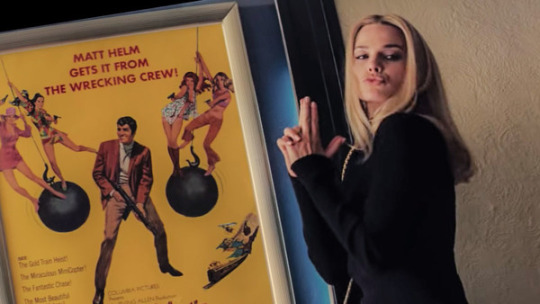
I never thought the day would come where my favorite movie of the year would actually be made after the 1970s, let alone by Quentin Tarantino. Then again, this movie is all about the end of Old Hollywood as well as a big love letter to the 1960s, so maybe it’s not that shocking a state of affairs. I adored this movie, the level of detail, the laidback yet elegaic vibe, the comedy and the relationships between all the characters. It was one of those movies where I loved even the scenes where nothing seems to be happening at all-- I mean, who knew Brad Pitt feeding his dog and watching TV could be entertaining?? But it is and I can't wait to see this one again!
INTENTIONS OF MURDER (DIR. SHOHEI IMAMURA, 1964)
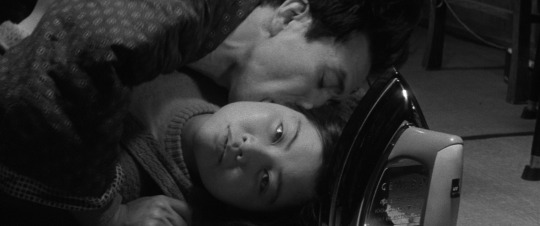
Intentions of Murder has an insane premise, one that runs the risk of being tasteless: a housewife in a miserable, exploitative marriage is raped by a sickly burglar during a home invasion. Even worse, she can’t shake him, as he’s suddenly infatuated and wants her to run away with him to the city. And weirder still: her current existence is so miserable that she’s TEMPTED. While abuse and rape are grim subjects for any story, Intentions is actually about a woman coming into her own and finally standing strong against all these men trying to use her. It’s a weird blend of drama and dark comedy, a truly savage satire on patriarchy and class-snobbery.
JOKER (DIR. TODD PHILLIPS, 2019)
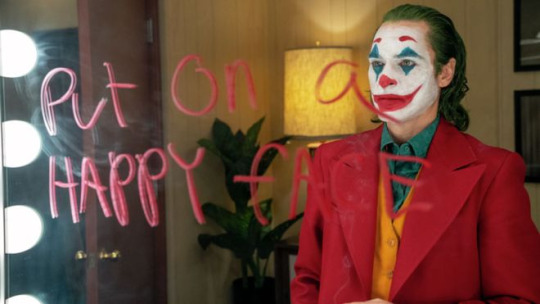
I went into this movie expecting to think it was overhyped and when I first left the theater, I was all ready to say “it’s good but not THAT good.” But it ended up haunting me for weeks afterward, and I found myself thinking about how everything just tied up so well together, from the grotty urban hellscape which serves as the setting to Phoenix’s brilliant performance. It reminded me a lot of A Clockwork Orange in how intimate it lets you get to this violent man while never pretending he is someone to be glamorized or imitated.
SIMON (DIR. MARSHALL BRICKMAN, 1980)
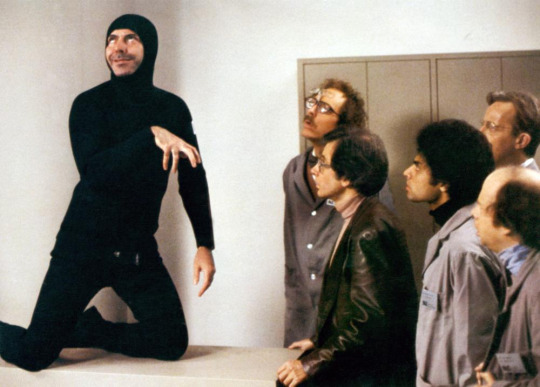
How do I even describe Simon? Alan Arkin is brainwashed by a group of overpaid intellectuals into believing he is descended from an alien toaster. Then he gets a messiah complex and starts gathering disciples as he rails against television, condiment packets, and muzak. It’s a little uneven at times, sure, but the satire is really inspired. The whole thing is like a combination of Mel Brooks, Stanley Kubrick, and Woody Allen’s styles, and it is quite hilarious for those who thrive on cult oddities.
PEEPING TOM (DIR. MICHAEL POWELL, 1960)
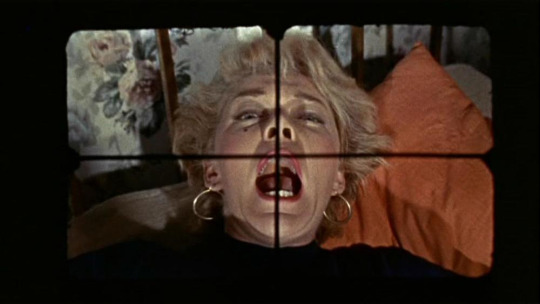
Though it came out the same year as Hitchcock’s Psycho and has been nearly as influential for horror cinema, Peeping Tom remains underseen by everyone save for film theorists. And what a shame that is, because this movie is more frightening than Psycho. Sure, that may be because Psycho is so predominant in popular culture and just so influential that it no longer has the same shock value, but there’s something about Peeping Tom that gets under my skin, something sad, even disgusting. I felt dirty after watching it-- and this is 2019!
MIDNIGHT MARY (DIR. WILLIAM WELLMAN, 1933)
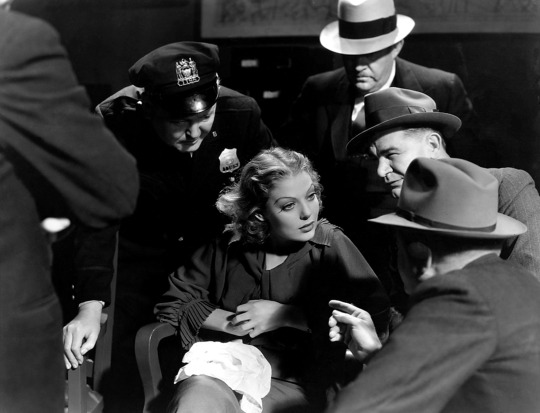
Loretta Young got one of her juiciest roles in this pre-code crime drama. Her Mary Martin is more than just a good girl forced into criminal circles-- she’s a complicated creature, compassionate and desperate and lonely and bitter and sensual all at once. This movie is a fast-paced, beautifully filmed ride, cloaked in that Depression-era cynicism that makes pre-code Hollywood of such interest to movie geeks the world over.
WILD BOYS OF THE ROAD (DIR. WILLIAM WELLMAN, 1933)
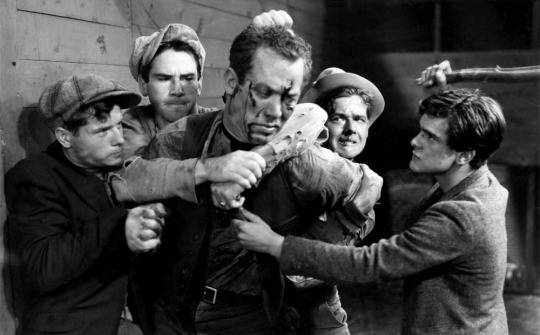
Wild Boys of the Road is a quintessential Depression-era movie, relentless in its bleakness and rage. That the main characters are all starving kids only looking for work makes their struggles all the harder to watch. William Wellman is quickly becoming one of my favorite directors: his gritty style and compact storytelling are just perfect for a ripped-from-the-headlines drama such as this. And the “happy” ending has one little moment that just knocks any smile you have right off your mug. Absolutely see this.
THE RUSSIANS ARE COMING, THE RUSSIANS ARE COMING (DIR. NORMAN JEWISON, 1966)
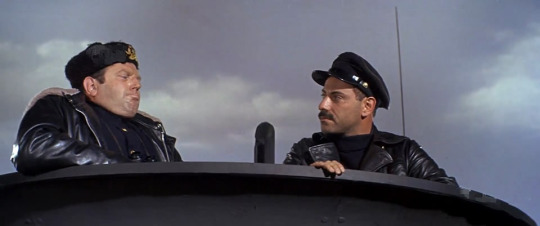
Sometimes, when you watch a movie only because a favorite actor is in it, you get subjected to pure trash like Free and Easy (oh, the things I do for Buster Keaton). Other times, you get cute gems like The Russians are Coming, The Russians are Coming, which, as you probably guessed, I mainly sought out for Alan Arkin. But the whole movie is hilarious, the best kind of farce comedy, populated by enjoyable characters and a sweet-tempered humanism that grounds the wackiness. While a little overlong, this movie is quite underrated-- and sadly, its satire of American xenophobia and Cold War panic is not as dated as we would like to believe.
ALL THE PRESIDENT’S MEN (DIR. ALAN J. PAKULA, 1976)
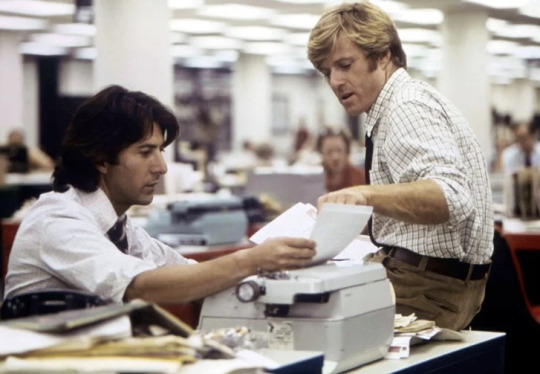
Who knew a political thriller where most people know the twist could be so intense and riveting? It’s about as nonsensical as feeling suspense when you watch a movie about the Titanic and hope the boat won’t sink-- but damn, it’s magical. All the President’s Men is real white-knuckle stuff, with Robert Redford and Dustin Hoffman projecting both youthful excitement and deep panic as they proceed with their investigation. It scarcely seems to have aged at all.
WHISPER OF THE HEART (DIR. YOSHIFUMI KONDOU, 1995)
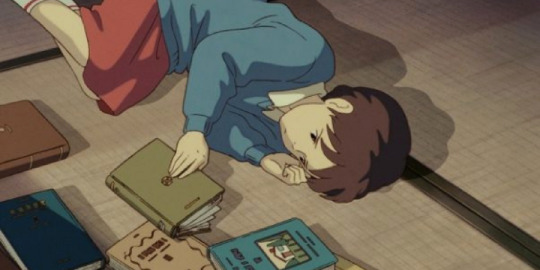
There’s a scene near the end of Whisper of the Heart where the protagonist Shizuku shows the finished first draft of her fantasy novel to her first reader, the grandpa of one of her schoolmates. She weeps because it isn’t the perfect image she had in her head, despite how hard she worked on it, but the old man tells her that it takes polishing and discipline to make the work come to its full potential. Few movies about artists are so honest about how hard it can be, how unsupportive others can be in their demand that everyone be “practical.” As a writer who struggles to create and constantly doubts herself, this movie spoke strongly to me. I recommend it to any creative person.
THE PHANTOM OF THE PARADISE (DIR. BRIAN DE PALMA, 1976)
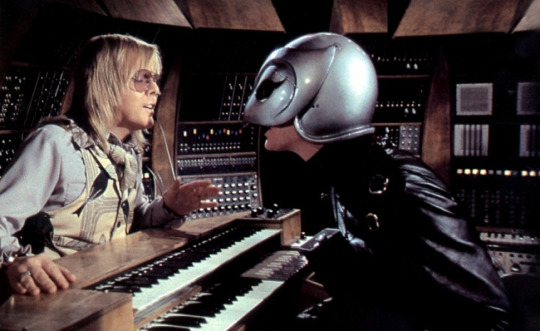
I’d been wanting to see this movie since my high school phan days. Holy crap, is it WEIRDER than I could have ever imagined, a true camp masterpiece. I’m shocked it was never tuned into a stage show actually, but then again, we would miss those trippy camera angles and we wouldn’t have Paul Williams as one of the greatest villains of all time.
DUEL (DIR. STEVEN SPIELBERG, 1971)
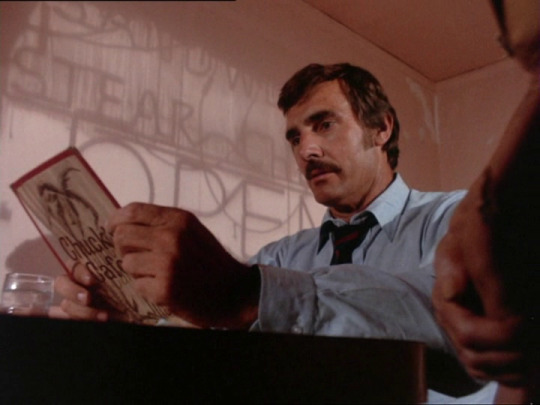
When people talk about the best movies made in the “Hitchcock without Hitchcock directing” tradition, why is Duel so seldom mentioned? The scene in the cafe, packed with paranoid tension and tense camerawork, alone should qualify it. Duel is most known as the movie which put the young Steven Spielberg on the map. It’s quite different from his later work, grittier and less whimsical for sure. Even the ending seems almost nihilistic, depending on how you view it. But damn, if it isn’t fine filmmaking.
CAROL (DIR. TODD HAYNES, 2015)
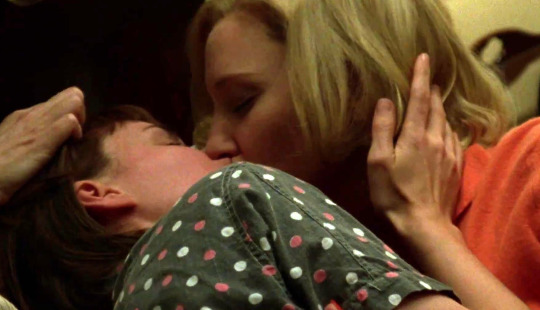
This gorgeous throwback to Douglas Sirk melodramas is also one of the best romantic movies I’ve seen in a while. Cate Blanchett and Rooney Mara have the sweetest, tenderest chemistry-- it was like seeing Lauren Bacall and Audrey Hepburn as love interests in a film. Unlike Sirk, there is little in the way of ripe melodrama here-- everything is underplayed, aching, mature. And I can say this is an adaptation that is better than the source book: it just feels so much warmer.
12 ANGRY MEN (DIR. SIDNEY LUMET, 1957
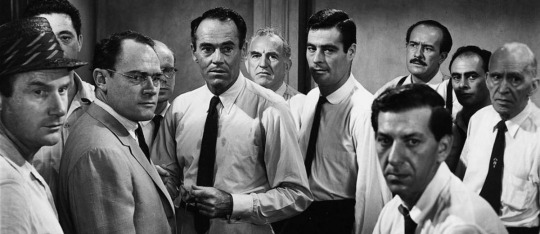
All I can say is that this was every bit equal to the hype. Common movie wisdom says people sitting and talking in a room is going to be boring on film, but movies like 12 Angry Men prove this is not so when you’ve got an excellently tense atmosphere, an inspired script, and a stable of fine actors to work with. Like The Russians are Coming, the Russians are Coming, this movie has not significantly aged-- much to society’s discredit.
A STAR IS BORN (DIR. GEORGE CUKOR, 1954)
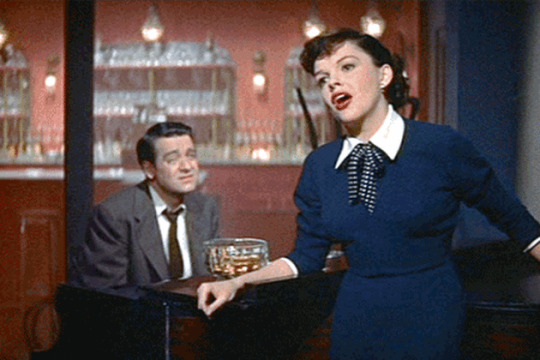
Another movie I went into not expecting to love as much as I did. When movies from the 20s or 30s tended to get remakes in the 1950s, I always find them too garish and big, victims of glossy Cinemascope and overlong runtimes. Compared to the lean 1937 classic original, I expected sheer indulgence from this three-hour remake. Instead, I got my heart torn out all over again-- the longer runtime is used well, fleshing out the characters to a greater degree. Judy Garland and James Mason both give what might be the best efforts of their respective careers, and the satire of the celebrity machine remains as relevant and scathing as ever.
BLANCANIEVES (DIR. PABLO BERGER, 2012)
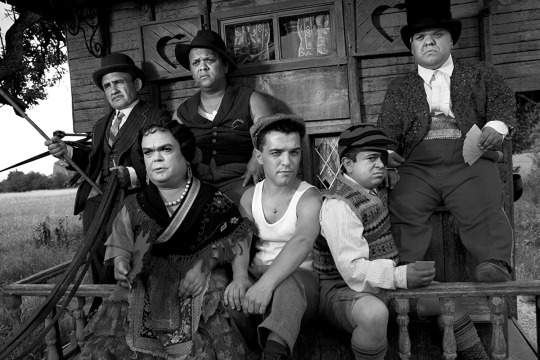
Oh, it feels like this movie was made for me specifically. It’s shot in gorgeous, expressionistic black-and-white. It’s set in the 1920s. It’s a clever adaptation of a classic fairy tale. It’s as funny and charming as it is bittersweet and macabre. Instead of more superhero movies, can we get more neo-silent movies like this? PLEASE?
THE FAVOURITE (DIR. YORGOS LANTHIMOS, 2018)
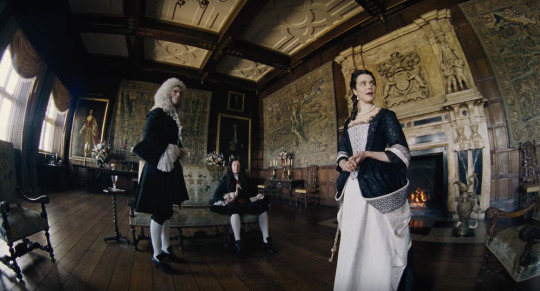
I’ve heard The Favourite described as a “bitchy lesbian Shakespeare play,” but this description, while a little true in terms of general tone, does not get to the heart of what makes this film brilliant. More than love or sex, this movie is about power-- particularly the corrupting influence of power. And it corrupts not only morals but love itself. Innocents become Machiavellian schemers. Lovers become sadomasochistic enemies. Good intentions turn to poison. This certainly isn’t a happy movie, but it is moving and, strangely enough, also hilarious. I was reminded of the chilly, satirical world of Kubrick’s Barry Lyndon more than once-- and for me, that is not a bad movie to be reminded of.
ON THE WATERFRONT (DIR. ELIA KAZAN, 1954)
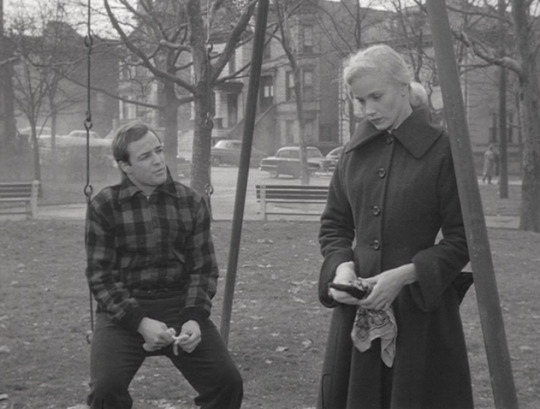
Another classic that’s been on my list forever that I was delighted to find worthy of its reputation. It’s a classic tale of redemption and social justice, perfectly acted and shot. While I still prefer A Streetcar Named Desire as far as Kazan is concerned, this might be a better movie in the objective sense. Actually, more than even Brando, Karl Malden is the acting highlight for me-- he plays a priest torn between staying silent or truly speaking for the Gospel by demanding justice for the poor parish he serves. Just brilliant work.
KLUTE (DIR. ALAN J. PAKULA, 1971)
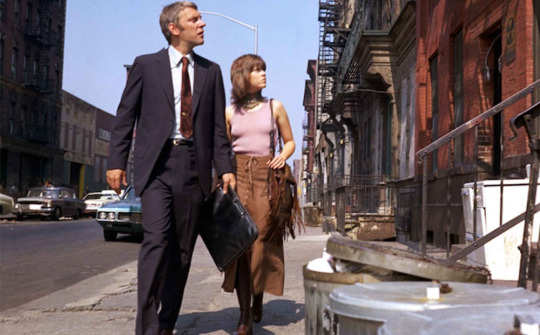
A perfect thriller, just about, and a great example of the “NYC is hell on earth” subgenre of the 1960s and 1970s. Jane Fonda is a revelation: she feels so real, not at all like a starlet trying to seem normal if you know what I mean.
KISS KISS BANG BANG (DIR. SHANE BLACK, 2005)
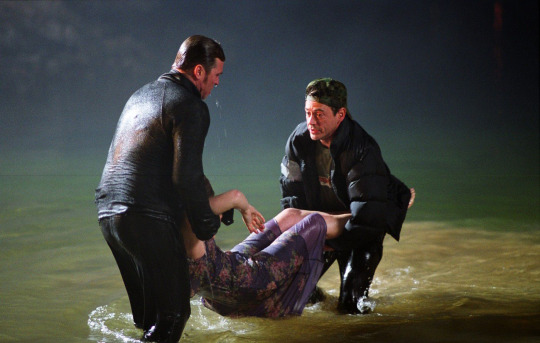
As far as subversive noir goes, this is the most entertaining. I would put it up there with The Big Lebowski as far as goofy takes on Raymond Chandler are concerned-- I don’t even really know what to make of it, but I laughed my ass off anytime I wasn’t going “WHAT???”
What were your favorite film discoveries in 2019?
#thoughts#peeping tom#simon 1980#kiss kiss bang bang#intentions of murder#once upon a time in hollywood#joker#a star is born#blancanieves#the russians are coming the russians are coming#all the president's men#whisper of the heart#carol#the favourite#12 angry men#klute#the phantom of the paradise#on the waterfront#wild boys of the road#midnight mary#duel
151 notes
·
View notes
Text
“The Saturday Interview: I Am In Eskew Podcast” —Recovered
The podcast is called I Am In Eskew; it’s a horror / weird fiction show delivered as a series of dispatches from a vaguely Central European city.
Eskew is a place that is, both spatially and psychologically, off-kilter. The streets wind too far in on themselves, the stairs climb too high, and both buildings and inhabitants can act in peculiar, obsessive, or frightening ways. And every episode we follow the narrator, David Ward, a kind of semi-unwilling immigrant to the city, as he finds himself stumbling into new aspects of Eskew. As for me, I’m a writer in London, working in digital media for the charity sector; I’m writing and narrating Eskew sort-of-anonymously. Not for any kind of grand scandalous reason, but because I think it adds to the fun and helps to keep the conceit alive a little bit.
Ah...that explains why I couldn’t find your name when I was researching for this interview. I thought my skills were slipping! I think it’s very interesting that Eskew focuses on horror based around spaces and buildings. Is this something of particular interest to you?
Yes, definitely! I think there’s a rich ream of horror, from The Haunting of Hill House to Ghostwatch, that delves into the idea that certain places can simply go wrong - and once these bad environments have been established and ostracised by society, they can’t be exorcised. They simply keep accruing power through the individual stories that play tragically out in their shadow.
I mention a real-life example of that kind of bad architecture in one episode; the Pope Lick Bridge in Kentucky, a place that looks and feels so sinister that it developed its own local folklore about a goat-man who attacks people who stray too close to the edge - and which has ended up resulting in deaths as visitors peer over the side trying to get a peek at the monster.
I find this kind of stuff fascinating, because it plays into my own paranoia about environments, and my dislike of ghost stories with explicably human antagonists. Like David says in the first episode, people aren’t frightening. Places are frightening.
If I’m sitting alone at home on a dark and stormy night, and I glance nervously up towards the bedroom doorway, my fear is not that my house is being haunted by a spirit called Mabel who died in the 19th century at the age of fourteen and is constantly seeking her favourite teddy bear...because all of these details both humanise her and make her ridiculous.
My fear is that there will be something standing in the doorway, because the doorway is where things come to stand.
Because unoccupied spaces, in our imaginations, must find something to fill them.
Could you describe some of your creative influences?
Thomas Ligotti is probably the writer I’m trying to crib from the most. Not so much in terms of his pessimism (or his love of puppets as a horror motif, which I can’t really get behind), but I see him very much as someone who bridges the gap between American horror and European absurdism. Some of my favourite stories of his - The Town Manager, Our Temporary Supervisor, The Red Factory - are hilarious as comedies! They’re very much scathing satires on our inadequate human response to the inexplicable and awful.
Junji Ito is also a big influence, in particular, his masterpiece Uzumaki: a collection of short stories about a town that’s driven mad by the symbol of a spiral. The brilliance is in the inventiveness with which he builds an anthology of horrors, with variety and with mounting awfulness, while playing on that simple motif.
I see Ito’s work as very much in the spirit of some of the most classic horror of all; Ovid’s Metamorphoses, where the threat comes not from an external monster, but from our own bodies and minds, transforming at the whim of cruel, fickle and obsessive gods...which feeds into a lot of what I’m trying to do with Eskew!
I usually try and avoid thinking about Lovecraft as an influence, even though David is clearly an obsessive, neurotic first-person narrator in the Lovecraft/Poe mould. I think there’s a lot of baggage around what constitutes ‘Lovecraftian’ fiction, and I didn’t want to set up false expectations by referencing him (like the idea that there might be some monstrous cosmic intelligence behind it all).
I really enjoy Lovecraft too, especially something like “The Shadow Over Innsmouth.” I think the idea of monsters living in the sea near the town and the strange, inexorable link the townspeople have with them makes it a lot creepier than something like “The Call of Cthulhu.”
Yeah! I think the elements in Lovecraft that have made him so franchise-friendly (these brilliant alien races and gods) have eaten away at the edges of Lovecraftian horror, bringing it closer to something that can be quite kitsch, even a kind of steampunk pastiche at times. With Eskew, I’m trying to keep to something I see in Ito, or in Ligotti, where any antagonists, whether human or otherwise, are only symptoms of something worse, something that’s simply a force of nature.
I see the city of Eskew as being a bit like a literal cancer in that sense - a highly complex structure where some of the cells (or in this case streets, art galleries, citizens...) have started to lose their original sense of self and are obsessively spiralling off in other, destructive directions...
What made you decide to do I Am In Eskew as a podcast, rather than as a graphic novel or book?
Honestly, it’s a lack of talent in the first instance, and a lack of discipline in the second!
Writing it as a podcast was my partner’s idea (she’s also the occasional voice of Riyo, an investigator looking into David’s disappearance, and she copy-edits every episode with me) - I knew I wanted to write a series of horror short stories based around the theme of urban isolation and weird architecture, but I was really struggling to get started.
She suggested that recording it as a podcast would force me to keep to a schedule, and hopefullyit might even give me some audience feedback to keep me excited about the project.
So it was a pragmatic choice, but it’s one I’ve really come to be thankful for! I think the medium is perfect for bare-bones, atmospheric horror storytelling (Knifepoint Horror is probably the best example of that ‘lonely voice whispering in your ear’ kind of fiction), and there’s an incredibly welcoming, friendly, mutually-supporting community of listeners and creators online.
Once the podcast is complete, I think I’d definitely like to look at compiling all of the episodes, editing and improving them, and turning it into a full-length written anthology. I’ve definitely made a few continuity slip-ups along the way that I’d like to correct, apart from anything else.
I’ve enjoyed Riyo’s episodes too, especially now that she’s directly looking into ‘hostile environments’. I feel like the contrast in tone and narrative style help to strengthen the series overall. Do you intend for the story of I Am In Eskew to have a specific ending in the future? If so, have you decided on the arc of the story?
I think David’s story (and Riyo’s) needs to be a finite one, definitely. In my experience, most successful protagonists in serial horror tend to be investigators, or monster-hunters. That choice of profession makes them witnesses to the story, rather than victims - effectively, they’re exempt from the psychological cost of whatever happens.
With David, I very much wanted to avoid that sense of safety; I want the horror to keep taking its toll on the character, episode after episode - which means that eventually he does need to find some kind of resolution!
Otherwise that psychological cost starts to seem fraudulent, and the whole thing turns into a predictable game of ‘David sees something horrible, then miraculously escapes at the last second’ week after week.
So I do know how the finale is going to play out; it’s really just a question of how many more stories I can reasonably invent for the show, without things starting to feel stretched, before we get there.
Mind you, it’s been established that there are recordings from Eskew that have gone missing, so it doesn’t need to end, even if it ends…
Do you have a favourite episode of I Am In Eskew so far?
I really like Episode 3: Excavation. A mysterious digging sickness takes hold in Eskew, with citizens tearing their own hands to pieces just to get into the ground - and in retaliation, a religious cult starts to form, extolling the virtues of the sky and constructing a grand tower.
It’s not necessarily the best-written episode structurally, and definitely one of the crudest in terms of recording quality, but it was the first episode where I felt I was pushing the boat out towards the kind of outrageous, absurdist horror that I really wanted to be writing, where normal human behaviour was just being given a couple of extra screw-turns towards something awful and monstrous.
It was also the first episode where I really saw a few people begin to respond on message boards, so that was really reassuring to me - when it first went out, I was petrified that I’d gone too weird to sustain anyone’s interest.
I tried to pick a favourite episode in preparation for this interview, but I honestly couldn’t narrow it down past five or six. If I really had to pick, I’d probably choose Illumination - the episode about the sinister and compulsive call of an old railway bridge. Are ideas like this based on real examples?
That example definitely is - it’s based on a railway bridge about a minute’s walk from my house! I love that kind of very modern ruin; old brick stacks stood out in the open, arches filled with ivy, graffiti in a place that seems impossible to reach...
There are a few other specific London inspirations (I based the Fish Market on Spitalfields Meat Market, for example), but with Eskew as a whole, I was thinking specifically of hillier cities in Western and Central Europe: Budapest, primarily, but also Lisbon (the trams and cobblestones), maybe a bit of Rome...
I’m used to flat English cities without any kind of panorama, so I find it a ceaselessly astonishing thing to be lost in a city’s streets and suddenly find myself up high, staring down over a sea of winding streets and rooftops...
How do you feel having wrecked people’s appreciation of AA Milne’s poem Disobedience by highlighting how deeply sinister it is?
I’ve actually been driving myself wild trying to decide if that poem is just a nonsense rhyme celebrating bossy children, or if there’s a class-snobbery thing going on (James James Morrison’s mother puts on a golden gown, and goes to the end of the town...does she get robbed there? Is the end of the town so unsafe because that’s where the low-income people live?)
You may have a point there about class. After whatever happens to her happens, the King himself gets involved with a reward. Clearly, she’s a lady with connections! Could you describe your writing process?
My writing process is very much informed by necessity - I commute in and out of London every day and don’t have a lot of free time, so I have to do most of my drafting while standing upright in a crammed train carriage!
Which may not be ideal, but on the other hand, if you’re writing a podcast about the horror of urban life, there’s no better place to find inspiration than a crowded, sweaty, angry Underground train filled with blank faces...
How long does it take you to put an episode together, from first word to the finished product?
I’m very quick; I usually sketch out the episode concept well in advance, then take about a fortnight to draft it and edit. Recording and audio-editing happens very speedily, again out of necessity, on the weekends! I try and devote a day apiece to each.
Turning to the technical side, what do you wish you’d known about creating a podcast at the very beginning?
There’s still an enormous amount that I don’t know! When it comes to even simple audio editing, I’m learning all the time. I very much am still just a schmuck in his living room, talking into a handmade sound booth on his days off - which is the beauty of podcasting, I suppose.
But I’d probably give my earlier self some very common-sense advice like...
...be brave. Stick to a schedule. Know the signs of burn-out. Listen to other people’s work in the medium before you dive in. Stay hydrated so your mouth doesn’t make those disgusting wet sounds when you’re trying to talk. Never forget that this should be fun, above anything else.
What motivates you to keep producing episodes?
Honestly? Seeing that it’s connecting with people. Spooking people. Entertaining people. That means everything.
If people would like to engage with you or support you online, what’s the best way to do that?
If you’d like to support the show...please do just shout about it! Tell your friends, leave a review on iTunes. It really makes a huge difference.
If you’d like to chat, we’re also on Twitter: https://twitter.com/eskew_podcast
9 notes
·
View notes
Text
The Best TV Shows of 2020
https://ift.tt/eA8V8J
Some year, eh?
We’re often poetic about TV around these parts. It’s no secret that we like to sing its praises as a powerful, restorative, and maybe sometimes therapeutic medium. But during a dangerous, confusing year, delving into the many ways that TV “kept us sane” or whatever feels reductive.
What we can say, however, is this: TV was around this year. And that’s no small feat as not every other medium was so lucky. Concerts and other live performances were canceled. The movie-going experience was upended (perhaps permanently), and even curling up with a nice book at a coffee shop was no longer an option for much of the year. The TV production schedule may have been disrupted, but for the most part, the television machine chugged along, providing us with a diverse (and often overwhelming) number of truly excellent options to take in.
This year we want to honor the best of those TV shows – not for any particular reason other than that it’s fun to do and we’ve all earned some year-end distractions. We had our staff vote on their favorite series, polled you the reader as well, then crunched all the numbers in an intensely complicated propriety equation (not really) to determine our winners.
Please enjoy our choices for the 25 Best TV Shows of 2020.
25. How To with John Wilson
How To with John Wilson is the heir to Nathan For You’s throne, which seems obvious considering the series boasts Nathan Fielder as an executive producer, but the new HBO series shares much of the fiercely beloved former Comedy Central series’ DNA. While Nathan For You used helping businesses as a jumping off point to explore social interactions and the funny, insane things that people may say or do if you point a camera in their face, How To with John Wilson purports to explain how to perform simple tasks like making small talk or splitting a check, but mostly showcases how beautiful, ugly, life-affirming, and odd life in New York City can be. It’s a difficult show to explain, but it uses dry narration and quick documentary-style footage to create laugh out loud set-ups and punchlines, and digresses into some of the most poignant, and “WTF” moments found in a comedy series. You may not learn much, but you’ll laugh a lot.
– Nick Harley
24. The Plot Against America
TV writing geniuses David Simon and Ed Burns (The Wire, The Deuce) are masters of subtlety. Their many shows, several of which are among the best in TV history, know how to conquer small moments en route to a bigger, oft devastating picture. During these very unsubtle times then, how could they possibly adapt Philip Roth’s equally unsubtle book about creeping fascism in America, The Plot Against America? The answer, as it turns out, is with the same gentle touch and keen understanding of the human condition as they always employ.
Like Roth’s 2004 novel, The Plot Against America picks up in an alternate version of the American 1940s, where real life aviation hero and Nazi-sympathizing populist Charles Lindbergh is elected president. The show then follows the working class Jewish Levin family as they deal with the fallout. Simon and Burns’ subtle touch works uncommonly well here. The Plot Against America’s six episodes are in many ways about how gradually and imperceptibly things can get worse until one’s home is no longer recognizable. For obvious reasons, the series resonated this year but its ability to summon creeping dread would have played well just about any time.
– Alec Bojalad
23. Lovecraft Country
A sprawling anthology with an overarching fable set in the depths of Jim Crow America in the 1950s, Lovecraft Country was an epic, political, sometimes gory, always ambitious sci-fi horror unlike anything else in 2020. Following the journey of Atticus (Jonathan Majors), Leti (Jurnee Smollett), and Atticus’s uncle George (Courtney B. Vance) on a mission to find Atticus’s missing father, the story combines real life racist horror with supernatural creatures inspired by H.P. Lovecraft.
Each episode is both a standalone story and part of the whole, playing with different subgenres. Ep 3 “Holy Ghost” is a classic haunted house tale with a historical twist against a backdrop of neighborhood racism, ep 5 “A Strange Case” is an extraordinary body horror which explores the female experience, 6 “Meet Me in Daegu” introduces a character from Korean folklore, while ep 8 “I Am” is a sprawling afrofuturist sci-fi. Created by Misha Green, exec produced by Jordan Peele and JJ Abrams, this is glossy cinematic stuff with a terrific ensemble cast. Talk about bang for your buck.
– Rosie Fletcher
22. His Dark Materials
If season one of this fantasy adaptation was carefully laying the tracks, then season two is hurtling along them, whooping out of the window as it goes. The new episodes started from the high-point of the season one finale and kept climbing. The difference is in tone – this time it’s warmer, keying more successfully into its characters’ emotional lives. It’s bolder too, demonstrating confidence by stepping away from the books to add scenes, humor and modern updates as required.
Season two, adapted from the second book in Philip Pullman’s original trilogy, sees Lyra and Will cross worlds and forge a bond. Will undertakes his own hero’s journey, one involving Spectres, a magical knife and the father he’d long thought dead. The real star though, is Ruth Wilson as Mrs. Coulter, a devilishly complex character into whose head this show is satisfyingly determined to get.
Season two is an episode short, thanks to COVID-19, but we should be grateful it made it here on time at all. The real delight is all the talent and effort that’s gone into telling such a weird story, one that only gets weirder from hereon in…
– Louisa Mellor
21. She-Ra and the Princesses of Power
Season 5 of She-Ra was the show at its absolute best. Every restriction seemed to be lifted and it just let loose with all the joy, deepness, and big queer energy it had ever wanted to display. Bless it for that because it allowed the show to go out on the highest of notes. We’d be here all day if we listed all the fantastic plots this season and how everyone got a chance to shine but no moment stands out more than Catra and Adora kissing.
It’s a moment queer fans had hoped for and were shocked it actually happened. Seeing two leads in a legacy property get to be not only confirmed queer but also kiss is still a rare sight and we can only hope it signals great change in animation going forward. We’re sad to see She-Ra go but glad it got to end so perfectly.
– Shamus Kelley
20. Pen15
During the 2011 “Middle School” episode of This American Life, host Ira Glass interviews producer Alex Blumberg, who presents a radical new approach to education in America: get rid of middle school. Children’s bodies and brains are just simply too volatile in their preteen years to meaningfully learn anything in the years between elementary school and high school. Give them a break, then pick up and try again in a couple years.
It’s hard not to think of that interview when watching Hulu’s wonderful middle school comedy Pen15. Lead characters Maya (Maya Erskine) and Anna (Anna Konkle) are very rarely seen learning something in class or poring over their homework. And why would they be? There are boys to obsess over, school plays to audition for, and moments that will scar them forever to experience.
Rarely has there ever been a more frank, honest, and hilarious exploration of the middle school years than Pen15. Much was made during the show’s first season about the adult Konkle and Erskine’s ability to portray their younger selves. And in season 2, they blend in so seamlessly that the novelty of the casting choice might never even occur to the viewer.
– Alec Bojalad
19. I Hate Suzie
The last time playwright Lucy Prebble wrote a TV series for Billie Piper, it was 2007’s Secret Diary of a Call Girl. London-set, glamorous, sexy and funny, that was a distinctly twentysomething story. Over a decade later, Prebble and Piper reunited to do something different in I Hate Suzie; still funny, but rawer, more experimental, and probing all the ways that a thirtysomething woman’s identity – wife, mother, and in this case, celebrity – can be defined by everything except herself.
Piper plays popstar-turned actor Suzie, whose life explodes when hacked photos of her cheating on her husband leak online. Suzie goes through the stages of grief in eight riotous half-hour episodes that experiment with form and genre. There’s drama. There’s satire. There’s singing and dancing. There’s Dexter Fletcher doing coke off a bare arse, and a whole-episode wank that explores the societal construction of female desire. It is, in modern parlance, a lot, in the most exhilarating and enriching way. These two had better not leave it another 10 years until their next collaboration. We demand more.
– Louisa Mellor
18. Rick and Morty
Did you hear? This guy turns himself into a pickle…a PICKLE! It’s wild. Every subsequent year that Rick and Morty airs, it gets harder to separate the “meme” of Rick and Morty from the show itself. Suppose that’s just what happens when a fanbase proves itself to be…uh, energetic, and the Merchandising Industrial Complex kicks itself into overdrive to produce some truly offensively bad Big Dog-style shirts.
Removed from the meta of it all, Rick and Morty still churned out some great episodes of television in 2020. The back half of the series’ two-part season 4 all aired this year and there were real gems included among them. Though it proved to be divisive, “Never Ricking Morty” was certainly among the most structurally ambitious installments the show has ever attempted. Then there was just the sublimely hilarious “The Vat of Acid Episode,” which was enough to earn the show a Best Animated Series Emmy.
– Alec Bojalad
17. Dark
Dark is already notable for reaching levels of popularity in the United States not often enjoyed by subtitled fare, but it also was afforded the rare opportunity to end on its own terms with its third season in 2020. Audiences fell in love with the generational stories of the families living around the nuclear power plant in Winden, Germany, marveling at casting choices for characters in their older or younger forms whose resemblances were spot on.
The time travel plot tied viewers’ brains into knots, but the desire to see an end to the apocalypse was made even deeper by the strong chemistry between Dark’s own Adam and Eve: Jonas and Martha. As the true source of the alternate timelines and causal loops became known, everything about the show’s reality was called into question, but the ending left a lingering question mark to entice fans to speculate long after the show had ended.
– Michael Ahr
16. The Untamed
While The Untamed technically premiered in 2019, the Chinese xianxia drama was one of the escapist stories that most defined a year we all wanted to get as far away from as possible. Bursting onto the transformative fandom scene to come in ninth on Tumblr’s list of the most-discussed live action TV shows of 2020, the foreign-language fantasy series tells the story of supernatural flautist Wei Wuixan (Xiao Zhan) from his humble beginnings as a teen cultivator-in-training to his controversial role as a demonic cultivator war hero to his time as a masked detective after he is mysteriously brought back to life in a stranger’s body 13 years after his gruesome death.
But, like any good melodrama, The Untamed is really all about the relationships. This is a complex emotional story about siblings and sects, honor and morality. At the heart of the interpersonal narrative is the epic romance between Wei Wuixan and his stoic swordsman boyfriend Lan Wangji (Wang Yibo). The Untamed is adapted from an explicitly queer web novel, but China’s anti-LGBTQ censorship laws require the series tell its love story via lingering gazes, clasped wrists, and declarations of undying devotion. The result is no less queer, as these canonical soulmates sacrifice everything but their fervid commitment to protect the innocent for one another.
– Kayti Burt
15. The Haunting of Bly Manor
In 2018, Netflix shrieked its way into the spooky season game with the breakout hit The Haunting of Hill House. The streamer then afforded creator Mike Flanagan the opportunity to American Horror Story-ize his work into an anthology of his own, thus The Haunting series was born. In typical second child fashion, The Haunting of Bly Manor had a world of expectations to live up to, which included its often-adapted source material, primarily the novella Turn of The Screw by Henry James (or Hank Jim as we like to call him) among two other works. Flanagan, who’s a heavyweight in the horror genre at this point, again eschewed a direct remake for a loose adaptation with Bly Manor, a slow burn, but ultimately a deeply personal and satisfying tale of ghosts, both of the faced and faceless variety, intertwined with Gothic romance.
The returning players from the previous season, Victoria Pedretti (Dani), Oliver Jackson-Cohen (Peter Quint), Henry Thomas (Henry Wingrave), Carla Gugino (The Storyteller), and Kate Siegel (a surprise character in an excellent episode 8), bring back some of the winning chemistry from Hill House. However it’s the newcomers to the series, T’Nia Miller as Hannah Grose the housekeeper, Amelia Eve as Jamie the gardener, and Rahul Kohli as Owen the cook, whose standout performances ground Flanagan’s headier concepts, like the series’ mesmerizing fifth episode. It’s through these characters that Bly Manor poignantly articulates how love can be as much of a burden as it is a blessing. Not long after your Bly Manor binge is complete, Flora’s line, “You said it was a ghost story. It isn’t. It’s a love story,” will crystallize the throughline Flanagan was gunning for. And if that line isn’t a lasting memory of the limited series, perhaps it’s Owen’s lucious mustache, the best on TV in 2020, that will live on.
– Chris Longo
14. Ted Lasso
In a relentlessly dark year, Ted Lasso was one of the few rays of sunshine that warmed our hearts. Its title character is so pleasant and optimistic, he makes Leslie Knope look like a curmudgeon by comparison. Folksy, thoughtful, and almost aggressively friendly, Jason Sudeikis’s Lasso is hired to lead a struggling English Premier League team in a move of sabotage, but ends up charming the pants off of the squad and proving the power of positivity.
The character is practically impossible not to like, and in a time of so much anxiety and frustration, it’s refreshing to spend time with someone like Ted. The title coach isn’t the only reason to watch; the show features well-crafted characters with satisfying individual arcs, comforting, yet well-executed sports movie tropes, and funny fish out of water culture clash moments. Ted Lasso is a breezy, low-effort experience that makes you feel good. What more could you ask for in 2020?
– Nick Harley
13. The Umbrella Academy
The first season of The Umbrella Academy was already a stellar achievement in adapting the gloriously weird Gerard Way/Gabriel Bá graphic novels, but season 2 took the show to another level in 2020. The varied reactions of the superpowered family to being stranded in 1960s Dallas were extremely enlightening and made the characters even more enjoyable with all of their quirks, flaws, and emotional depth.
Of particular interest was the manner in which Allison strove to lead a normal life with a husband that loved her despite the difficulties of being Black in the segregated South and her determination not to use her powers. Fan favorite character Ben also received a noble and inspiring arc that led to a completely new role for him in season 3. Although there are plenty of mysteries remaining, the unfolding backstory leaves us always wanting more of The Umbrella Academy.
– Michael Ahr
12. The Great
“Russia must be saved, and I with it.” An occasionally true story from The Favourite co-screenwriter Tony McNamara, The Great is a satirical look at the rise of Russian monarch Catherine the Great (Elle Fanning, getting a chance to show off her comedic chops), from her arrival from Prussia as a naive teen bride to her time plotting the death of her husband, Emperor Peter III (Nicholas Hoult, seemingly having the time of his career). The Great is cutting, clever, and hilarious, but, like The Favourite before it, its true secret weapon lies in its moments of earnest emotion.
The Hulu series revels in the often absurd nature of its subject matter, but not at the cost of ignoring the trauma and joys of its often gruesome world. The unpredictability of which kind of scene you will get next—absurd, deeply emotional, or both—creates a fantastic dramatic tension that sustains throughout the entire 10-episode first season, perhaps necessary in a story that, should it follow the broadest of historical strokes, the viewer knows will end in Catherine’s triumph. Huzzah!
– Kayti Burt
11. Harley Quinn
This year, we found out the answer to a question that no one was really asking – “who would win: a big budget Birds of Prey DC spinoff movie starring Margot Robbie as Harley Quinn, or one small Harley Quinn-focused animated series that was seemingly about to be left for dead on the ailing DC Universe streaming service?” Harley Quinn won, for everyone who cared to investigate, as the show leveled up in season 2 by having the balls to let Dr. Harleen Frances Quinzel fall in love with her sardonic roommate Poison Ivy on screen and ditch any lingering feelings she had for the Joker, but for those not invested in the romance (they should go have a soup and rethink their priorities) there was so much else going on beyond deconstructing its central character.
Animated shows are typically seen as an immature, lesser form of entertainment than live-action series, but just imagining the creativity you’d need to come up with this many running jokes, in-jokes and meta jokes for the larger-than-life characters of Gotham is exhausting. There’s so much writing talent behind Harley Quinn that a third season wasn’t just expected, but demanded. And indeed, Harley Quinn will live on at HBO Max, but if it hadn’t happened, we’d do what the Doctor ordered and RIOT.
– Kirsten Howard
10. BoJack Horseman
Through its superb six-season run, BoJack Horseman’s tonal brilliance came to be an expected fact of life. Early on, it was tempting to pull non-viewers aside, shake their shoulders, and yell in their face “No, you don’t get it! It’s an animated comedy about a horse that was a ‘90s sitcom, yes, but it’s also a searing exploration of depression, dysfunction, and the dismal nature of the human condition!” It’s to the show’s eternal credit that that stellar comedic/dramatic tightrope act became all but a given a few seasons in and the world adjusted to it thusly. But even with that level of familiarity and comfort, it’s jarring just how well the show pulls off that delicate formula in its final, and perhaps best season.
BoJack Horseman season 6 premiered eight of its final 16 episodes in 2020’s first month and their dramatic resonance carried through the rest of the year. The story ends here as we always expected it might. BoJack’s past finally catches up to him, and when he becomes a pop culture pariah, he slowly begins to undo whatever progress he made throughout the series, culminating in a stunning penultimate episode where BoJack faces the infinite and meets up with all the figures in his life who died along the way. But it’s not until the show’s very end where the message comes into clear focus. BoJack has to start all over again, just like we all must from time to time. The difference this time is that the other people in his life are finally prepared to move on…possibly without him. “Hey, wouldn’t it be funny if this night was the last time we ever talked to each other?” BoJack says to Diane as they look up at the Hollywood night sky. Wouldn’t it be funny indeed.
– Alec Bojalad
9. Legends of Tomorrow
There is no superhero TV show that has strayed as far from its superheroic roots than Legends of Tomorrow. Despite the fact that its full official title is quick to point out that this is indeed DC’s Legends of Tomorrow, you’d be hard pressed to find a DC show less overtly concerned about its comic book roots, or even with any synergistic responsibilities it may have to the other DC shows in its orbit. Sure, Supergirl, Black Lightning, The Flash, and Stargirl are great, and they’re note perfect representations of what makes those characters special, but Legends does everything those other shows do, but with far less recognizable characters, with far more laughs, and an effortlessly perfect ensemble cast boasting chemistry for days.
No matter how high the reality-altering stakes, it all seems less important than watching the friendships between this crew of superheroic time traveling misfits. Legends of Tomorrow is everything good and hopeful and pure (ok, well…maybe not pure, especially where Matt Ryan’s John Constantine is concerned) about superhero shows without any of the baggage, and often without the superheroics. Always hilarious and often surprisingly touching, there’s not a single superhero team on the big or small screen that you’d rather actually hang out with. You don’t have to love superhero TV to love Legends, you just have to love TV.
– Mike Cecchini
8. Schitt’s Creek
People who love Schitt’s Creek LOVE Schitt’s Creek. It’s almost become cult-like in its following, so the arrival of the sixth and final season felt like an event and the end of a journey not just for fans of the show but the stars themselves. Season six isn’t the best season of Schitt’s – it leans into the schmaltz and sentiment heavily and throws realism to the wind in favor of the absurd but if you’ve come this far with the displaced Rose family and the sometimes odd but overall endearing residents of Schitt’s Creek, you won’t be disappointed.
All the major players get their arc. Alexis and Ted’s separation is heartbreaking, Moira’s Crows movie premiere is a hilarious mess, some of the Jazzagals almost join a cult… the season is packed with ridiculous scenarios in between many more moments of genuine sweetness as it gently guides its characters to an end. The finale comes together with David’s wedding to Patrick – a perfectly idiosyncratic affair in the Schitt’s Creek town hall. It’s a moving send off to which we’re all invited.
This is a show about family and community, created by a real family – father and son Eugene and Daniel Levy (sister Sarah plays Twyla) – that spawned a community of fans. This might be the end of Schitt’s Creek but we can always re-visit.
– Rosie Fletcher
7. Devs
Alex Garland’s unsettling, yet visually gorgeous science-fiction parables are always thought-provoking, but FX’s Devs asks bigger questions than any of the writer/directors previous projects. Do we determine our own fates? Does the multiverse exist? Can computers predict our future? Devs isn’t just heady techno-philosophical musings, it spends its runtime being a pretty satisfying corporate thriller, with our protagonist Lily (Sonoya Mizuno) investigating the mysterious disappearance of her boyfriend.
This is a somewhat scathing indictment on Silicon Valley culture, with a Google-esque tech company operating with unmatched power in the shadows. Featuring a moving dramatic performance from Nick Offerman and a star-making turn from Sonoya Mizuno, Devs is just as pretty, existentially threatening, and hard sci-fi as Garland’s beloved films Ex Machina and Annihilation. If you love thrillers, but are also interested in Quantum Theory, this was the limited series you’d been waiting for in 2020.
– Nick Harley
6. The Mandalorian (READERS’ CHOICE)
Starting with its first season and extending into its improved second, The Mandalorian just works. Jon Favreau and Dave Filoni’s creation about the galaxy’s most beloved bounty hunter dad is the kind of forward-thinking Star Wars project that works perfectly on a streaming platform.
If you’re a massive Star Wars nerd, The Mandalorian continues to provide plenty of Easter eggs and callbacks for you, but the show excels at being both a fun reentry point for fans fatigued with the sequels and prequels, and a standalone adventure series for viewers who don’t have much knowledge of Star Wars at all, deftly creating a string of sidequests in a galaxy far, far away that put you firmly in the beautiful Lone Wolf and Cub-like tale of Mando and Grogu as they fly toward an unknown future.
As we recently learned, there will come a time in the next few years when we will be simply drowning in Star Wars TV series, as ten(!) of them are in development, but for now, we get to really savor the intricate worldbuilding going on in The Mandalorian.
This is the way.
– Kirsten Howard
5. The Boys
The Boys was a breakout hit when it first landed on Amazon’s streaming service, but when the series returned, there was a bit of a backlash from fans of the show who were enraged that some of its new episodes would arrive weekly, unlike the binge-ready first season. Luckily, Season 2 had so many “what the fuck” moments in store that the griping soon quietened down, and the show eventually found its stride again after a slow start. Our diabolical, supe-fighting team led by a rather distracted Billy Butcher dealt with one bonkers revelation about Vought International after another this season, while the Supes themselves battled with their own humanity, and both groups often found common ground where they least expected it.
It’s really hard to pick a favorite moment from Season 2, but if you’ve forgotten how out there it was, let us present a wild bouquet that includes “Homelander angrily wanking over the city in the form of his own demented Bat-Signal”, “The Seven filming a very (very) thinly-veiled Zack Snyder-esque superhero movie that had undergone a Joss Whedon rewrite”, “a massive-dicked supe-in-captivity called Love Sausage”, and “a timid child getting confidently pushed off the roof of a house by his own beaming father”. And that’s without bringing up the whole “immortal Nazi” stuff that occasionally propelled the narrative into Verhoeven-level satirical territory.
There were things that didnt work about Season 2, and we can argue about them forever, but there’s one thing that everyone can agree on: if Antony Starr doesn’t get two armfuls of awards for his performance as Homelander, a fucking travesty has occurred.
– Kirsten Howard
4. I May Destroy You
On a night out while writing the second series of her acclaimed sitcom Chewing Gum, Michaela Coel was drugged and sexually assaulted by strangers. What she did with that experience – alchemizing it into a wise and fearless TV drama about trauma and survival – was extraordinary.
I May Destroy You is an extraordinary series. In it, Coel plays Arabella, a young writer also drugged and raped on a night out, while under pressure from publishers to follow up her hit book debut. With long-ranging flashbacks, the story moves through the next year in Bella’s life. We see her draw power from her new identity as a survivor and (often clumsily) navigate close friendships and new sexual relationships. She strays from likeability, changing in response to what happened, and in a transcendent, experimental finale, teaches herself how to live.
Coel is a bewitching lead with excellent support from Weruche Opia and Paapa Essiedu as Bella’s friends Terry and Kwame. This is no dreary misery memoir. It’s surprising, confrontational, often funny and always buzzing with life – a frank and much needed course correction for telling this kind of story on screen.
– Louisa Mellor
3. What We Do in the Shadows
Over the past decade of television, we’ve come to expect a lot out of our TV comedies. Since the Emmy Awards now categorize just about anything that’s 30 minutes long as comedy, the genre is now home to things like shockingly dramatic coming of age tales, intensely personal narratives, and experimental structures. This evolving of the half hour format is a welcome one. At the same time, however, sometimes you just want to laugh.
Enter What We Do in the Shadows. In its remarkable 10-episode second season, this FX adaptation of Jemaine Clement and Taika Waititi’s movie of the same name made a serious case for itself as the funniest show on television. And it did so in shockingly simple fashion. In season 2, the character list remains short: just Nandor (Kayvan Novak), Laszlo (Matt Berry), Nadja (Natasia Demetriou), Guillermo (Harvey Guillen), and Colin Robinson (Mark Proksch) make up the show’s cast of characters for the most part (give or take a Mark Hamill or Nick Kroll). And that’s all they need.
This year, the writers and performers all operate at the top of their game to make every possible plotline work and every character pairing sing. The comedic energy is top notch from the season’s opening “Resurrection” episode through midseason classics “Colin’s Promotion” and “On The Run” and all the way to the finale “Nouveau Théâtre des Vampires.”
– Alec Bojalad
2. Better Call Saul
The penultimate season of Better Call Saul was an absolutely brilliant run of episodes that perfectly set the stage for a climactic conclusion that looks to be every bit as heart-wrenching and explosive as the final season of parent series Breaking Bad. The show successfully introduced Lalo, perhaps the most charismatic and terrifying villain in Vince Gilligan’s Albuquerque, and merged the series’ seemingly disparate storylines by bringing fan-favorite Kim Wexler closer to the dangerous dealings of the cartel.
It turns out that Jimmy becoming Saul wasn’t the tragedy that we should have been anticipating, it was Kim embracing the Saul way that we should have been worried about. The show’s strengths have always been its meticulous attention to details, fascination with processes, and humanistic view of exactly why someone like Jimmy McGill might break bad and become a dishonorable huckster like Saul Goodman. Those strengths only became more apparent in the thrilling, low-key heartbreaking fifth season.
– Nick Harley
1. The Queen’s Gambit
Oftentimes when assessing the quality of TV shows, we talk about how “timely” they are. In fact, if you scroll back through this list, you will find at least a few instances of just such language. The appeal to Netflix’s stylish, thrilling limited series The Queen’s Gambit, however, is just how timeless it is. And in a year with plenty of timely TV shows, that distinction was enough to launch the show to the very top of our best-of list.
Though we on the television side of Den of Geek are loath to call any rightful TV show an “x-hour movie,” there’s no denying that The Queen’s Gambit fits that mold. But this is not just any kind of filmic experience. It’s a throwback to a ‘70s and ‘80s style of simple, elemental storytelling that simply knows how to win over an audience. The beats of The Queen’s Gambit are predictable, but elegant and perfectly executed. Beth Harmon (the ethereal Anya Taylor-Joy) is a quiet, wide-eyed hero armed with one skill that can make the world care about her and in turn make her care about herself.
So she uses that skill and assembles her tools – her King, Queen, Bishops, Knights, Rooks, and Pawns, to embark on a classical bildungsroman journey of self-discovery and chess dominance. Like a deftly executed chess game itself, each of The Queen’s Gambit’s seven episodes acts like a move on a chess board. Some moments are triumphs, some are defeats, and some are sacrifices. But they all lead into one definitive, enormously satisfying checkmate.
– Alec Bojalad
cnx.cmd.push(function() { cnx({ playerId: "106e33c0-3911-473c-b599-b1426db57530", }).render("0270c398a82f44f49c23c16122516796"); });
Other shows receiving votes: Animaniacs, Ozark, High Fidelity, Star Trek: Picard, The Last Dance, Mrs. America, Solar Opposites, The Hollow, Killing Eve, Noughts + Crosses, Outlander, Star Trek: Discovery, Vida, Saved by the Bell, Lucifer, Gangs of London, Mythic Quest: Raven’s Banquet, World on Fire, Crash Landing on You, Infinity Train, Locke & Key, McDonalds & Dobbs, Into the Night, The Good Lord Bird, The Last Kingdom, DuckTales, Little Fires Everywhere, Normal People, Brooklyn Nine-Nine, The Pharmacist, Doctor Who, Away, Dublin Murders, Great Pretender, The Babysitters Club, Tiger King, The Crown, Ramy, The Shivering Truth, Perry Mason, Keep Your Hands Off Eizouken!, The Undoing, Westworld, Doom Patrol, Stargirl, The Clone Wars, P-Valley, Bridgerton, Homeland, Stumptown, The Magicians, Bob’s Burgers, Primal, Jurassic World: Camp Cretaceous, Zoey’s Extraordinary Playlist, Search Party, Roadkill, Raised by Wolves, The Flight Attendant, The Eric Andre Show, Defending Jacob, The Outsider, Julie and the Phantoms, Brave New World, Utopia, Carmen Sandiego, Brockmire, Somebody Feed Phil, Adventure Time: Distant Lands, Dead to Me, The Gift, Ghosts, YOLO: Crystal Fantasy, The 100, The Spanish Princess, I’ll Be Gone in the Dark, Adult Material, Fargo, Deadwater Fell, The Flash, Archer, Weird But True, Evil, Motherland: Fort Salem, Baghdad Central
The post The Best TV Shows of 2020 appeared first on Den of Geek.
from Den of Geek https://ift.tt/3oUilhV
0 notes
Text
Cerebus #2 (1978)
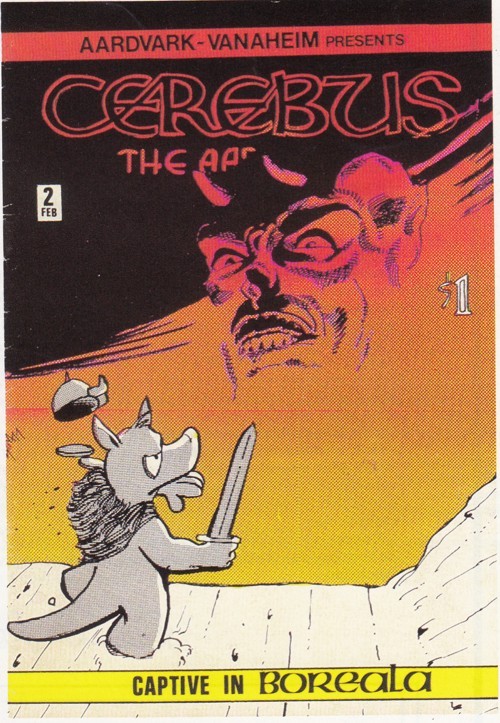
Is this the one where Cerebus becomes so obsessed with feeding coins into this devil thing to receive slips of paper with his future on them that he becomes unable to make any decisions at all?
Deni's essay on the inside cover of Issue #2 mostly just points out that comic books are weird and dumb and the fans are huge nerds. She ends it saying, "Comics is a crazy business, but you know something? I wouldn't want to be anyplace else. That is if I had a choice." Six years later, her choice was to get the fuck out of her marriage with Dave Sim. Although she still published comics at her new company Renegade Press. I'm not sure what she did after she closed up shop on that sometime around 1989, I think. Maybe she realized she did have a choice and somehow got the fuck away from comic books. I am not frantically trying to find her phone number on the Internet right now asking her how she did it. I'm too busy re-reading all of my old comic books, most of which I didn't even like the first time.
Dave Sim's essay about Cerebus #2 printed in the Swords of Cerebus compilation is a bloodcurdling breath of honesty. Unless I meant refreshing? Is refreshing or bloodcurdling the description used to entice people to buy gum?

You should probably figure out how to enlarge this on whatever crutch of a device you're reading this on so that you can read it because it's entertaining.
As a reader, you instinctively realize that most artists hate drawing the boring stuff in the background. Those that fill the scene in with lots of nice little details are probably a joy to work with but they're also probably insane when you realize the deadlines they're under and they can't help drawing a fiddly little tea service on an antique hutch next to a couple of exotic potted plants. You know, things that will probably need to be drawn repeatedly across several panels from different angles! But what I hadn't really thought about was how the writer part of Dave Sim was initially so lazy about writing humorous stories and dialogue. When I think of Cerebus, it's the funny moments and hilarious character interactions which I think of first. Or maybe second. The first thing I think of is Sandman Roach sucking himself off with his weird Sandman mask.
I guess the main thing I learned from Sim's introduction is that I'm not going to be reading a funny issue now. Not that the first issue was terribly funny. It was much like Sim writes in this one, really. The comedy comes across in the first few pages as the readers yuck it up over a tough aardvark chopping off hands and threatening bartenders (the bartender's line where he changes up his "I won't serve you. You're a...guest! And I serve guests at their table" was probably the best line of the first issue). The rest is so solidly Conan invading a wizard's tower that you're not expecting any jokes. Although Sim tries to lighten the mood by making the wizard a bit of a bumbling, aging middle-management type who just seems tired of having his work space invaded by thieves.
The narrator opens this issue describing some of Cerebus's travels since the end of the last issue. In that blurb, we get the first hints of the geography of Estarcion.

At some point, we'll get a map. But it won't matter much since most of issues 26-110 or so take place in the city-state of Iest (hell, maybe 90% of Cerebus takes place in Iest up until Guys).
Do we ever find out any more about the Blood Wars? I don't think so. Remember, a lot of the early issues are setting a sword and sorcery mood. Sim will revisit some of the characters and places in these first 25 issues but only sparingly and usually in new contexts, thus making the overall story seem more layered and fully fleshed out than it initially was.

The first issue set the mood with Cerebus bouncing around on the back of a horse as he pulled into town; this one sets a slightly different tone.
Notice how Cerebus has two swords in this picture? I think Dave remembers that at some point in the future and comments (either through The Judge or through Sim's guest appearance itself) on how Cerebus losing one messes up his future or something. It's also possible I'm remembering that wrong! But I'm pretty sure we get a short history of Cerebus's accessories and their import (his helmet, the necklace, his swords).
Cerebus is captured by the Boreleans who decide to sell him to a freak show in Gurann. I don't know where Gurann is. I also don't know where Borelea is. Or Tansubal. Or Estarcion. In response to the Chieftain's plans, Cerebus curses him in Paranian. I also don't know where Parania is. Cerebus's curse is "Comne ye tama stet fegria!" It translates roughly to "You can shove the freak show up your asshole." What I'm saying is that we all now sort of know the Paranian word for asshole. It's probably "fegria."
Doing a Google search of the word "fegria" and "cerebus" resulted in a blog from 2017 which planned to do a critical review of every issue of Cerebus. It made it three issues. But in glancing over the blog, I noticed a quote that was footnoted as being by Tim Kreider in an essay from The Comic Journal #301. I fucking love Tim Kreider and now I need to get my hands on that issue. Anybody have a copy they want to send me?!
Before Dave Sim gets to the part of the story without any jokes, he makes this classic joke when Cerebus battles to prove himself worthy of joining the Boreleans.
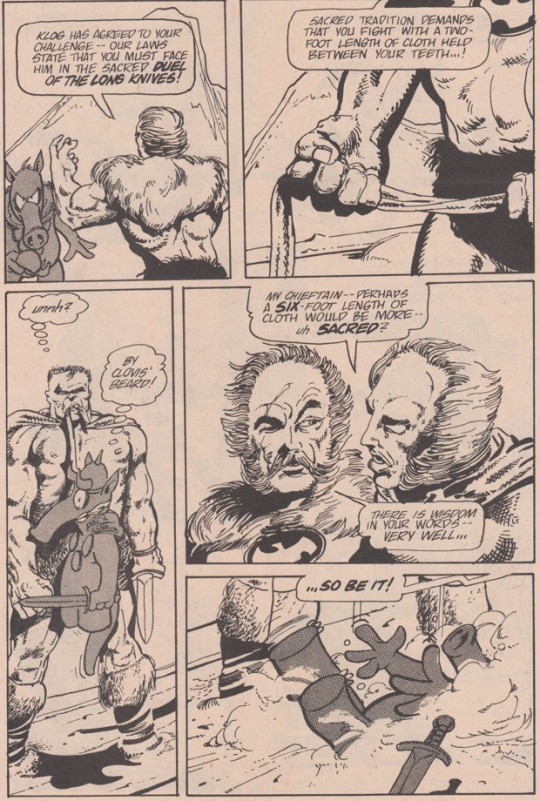
Ha ha! Look at how funny the little aardvark guy looks!
Two issues in and we already see how Dave is using the fantasy setting to satire real life. Previously, he showed how easily the powerful, entrenched wizard was defeated because he was just a blowhard hiding behind illusions which made him seem more powerful than he really was. Here, we see a couple of guys quickly reworking sacred traditions on the fly to cater to their current needs. Maybe they're just jokes but they tell the story of who this young Dave Sim probably was: an atheist with a mistrust of authority, status quo, and almost certainly mainstream comic book publishers. Just wait until that young Dave Sim suddenly isn't atheist any more and has decided he's the authority of everything! Boy do those issues suck dog turds that were turded out of dogs who sucked on dog turds. I'm specifically thinking about the Latter Days explication of Genesis as a story about a lying female god's power struggle with the real, upright male God. At least I think that's what was happening. I might have slept through 85% of time I was reading it.
Cerebus wins the knife fight with an unorthodox yet apparently known well enough to be dreaded Earth Pig move.
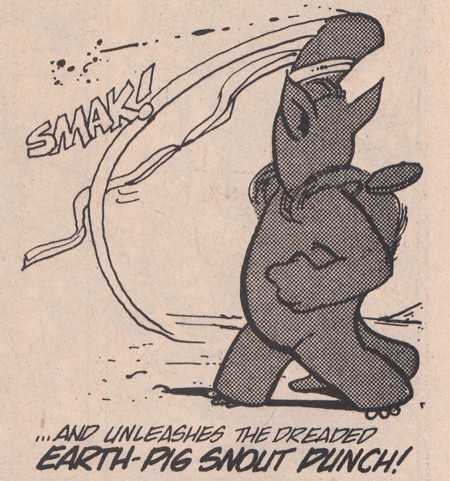
So dreaded that I don't think Cerebus ever uses it again. Granted, his snout gets much shorter and less effective as the series goes on.
I'm sorry I scanned that panel because the really good joke comes immediately on the next page where the Chieftain is all, "You're from the South so you probably have a moral code against killing an unarmed combatant which means sacred tradition will..." at which point he's interrupted by Cerebus stabbing Klog in the face. Cerebus's moral and ethical code are pretty animalistic. Probably because he's an animal? Although you can't argue with some of his wisdom when he becomes Pope. I mean, "One less mouth to feed is one less mouth to feed," is some thoughtful shit, especially after you've just thrown a baby fifty yards.
Cerebus spends two days marching with the Boreleans before the army is overrun by an army of ensorcelled men. Cerebus understands magic enough to completely mistrust it so instead of fighting, he slides down a snowy cliff to escape. That was the part of the story where Dave Sim's writing persona was all, "I can't be funny any more. Let's put Cerebus in a hole where he has to deal with something serious." So now it's basically a new story. If I remember the Conan books I read when I was younger, the narrative structure isn't too far off from those. The books just seemed like a bunch of scenes that didn't really have any plot thread connecting them. Probably because they were just a bunch of short stories from pulp magazines shoved together in book form. What? You expect me to actually do research on a memory from my past instead of just speculating?! How not lazy do you think I am?!
As Cerebus wanders the dark caves under the ice, he remembers an old legend about The Eye of Terim guarded by the Demon Khem lying underground in Borelea. Could this be the place?! Could he be walking into deadly danger? Or extravagant riches?! Did Dave Sim forget that Tarim was spelled with an "a" which birthed Terim later because he wouldn't admit to a mistake? Did this duality of Tarim and Terim cause him to believe the religions of The People of the Book were infected with the same duality? And when did he decide the split was down gender lines?!
That last question was a rhetorical question but also one that can be answered: he made that decision when he was interviewing mothers and daughters for his story "Mothers & Daughters." At that time, he realized women he didn't want to fuck were vapid and uninteresting. His conclusion was that this was an issue with women and not an issue of self. I guess his reasoning was "I don't want to fuck men but I find them interesting therefore women must not be interesting!" Don't worry! According to Dave, that's not a sexist conclusion. It's a completely rational one because he's a man and he came to it.

Cerebus climbing down a pillar of faces, descending deep into the Earth. Later, he'll do the exact opposite. I don't mean to suggest it means anything! It's just a nice callforward!
This is only the second issue and Dave is already using the comic medium for all its worth. The pillar remains static so he's able to split the image into panels which then allocate separate time intervals. You can tell he's a long time fan of comics.
We learn that the Eye of Terim is the "most precious of the five spheres of the Gods." So now we know there are five spheres of the Gods. What are they for? Where are they? Will Cerebus pursue more of them? Or will he just be told about them later when he goes into outer space? Probably that last one.
Cerebus does utter an oath to Tarim so Dave probably finally remembered how he originally spelled it but only after inking the previous pages. Remember the essay from last issue that you didn't read? He described his process of fully completing each page before moving on to the next one. So now he's got a problem! The better solution would probably be to fix the previous errors. But that's a solution that takes more work. An easier solution is to suddenly decide that there are two confusing Gods with pretty much the same name only they're pronounced differently. How are they pronounced? I don't fucking know. Comic books aren't audio!
Look, I'm a cynical dick! It's entirely possible that Dave Sim had already decided that Terim was the name of God in the North and Tarim was the name of God in the South and that was what caused so much strife. I could give Dave the benefit of the doubt on this. I suppose I will although it's less fun to believe Dave knew what he was doing than to pretend he's made tons of stupid mistakes.
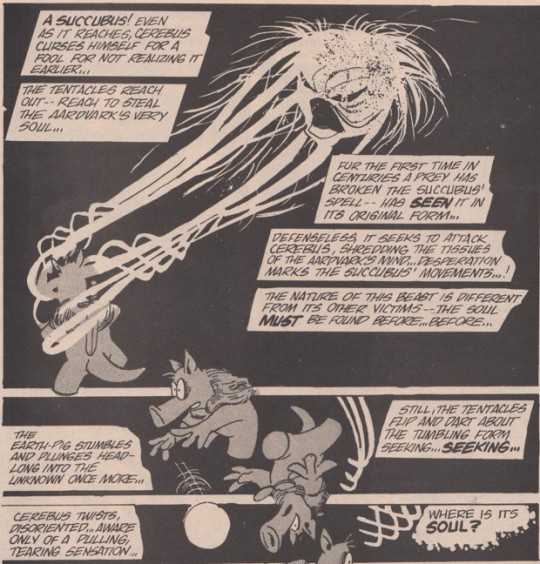
It turns out the Eye of Terim was actually a succubus trying to trap prey.
Maybe Dave Sim is a genius who, from Issue #2, was already working toward his "Mothers & Daughters" themes and his Tangent essay! Here we see a woman lying in wait to steal Cerebus's soul and tempt him from his righteous path of reason! I'd say this is technically the first female character in Cerebus and it's kind of ideologically on point with the rest of the series!
Also, we learn aardvarks don't have souls. I think that's the really important bit.
I can't leave this bit yet! Look at how the encounter is worded: "For the first time in centuries a prey has broken the succubus' spell -- has seen it in its original form." It's as if Dave is saying, "See? I'm the first guy to have noticed that these hot women aren't just hot women! They're traps! I mean Cerebus was the first to see it!" And as the succubus becomes unable to destroy Cerebus's mind and reason and rationality, it becomes desperate. It becomes emotional! It screams and rants and raves!
Wow. I didn't think I'd have to deal with Dave Sim's philosophy about the Marxist/feminist/homosexual axis for at least another hundred and fifty issues! Maybe I should just pretend I'm reading too deeply into what's basically a Dungeons & Dragons encounter.
Cerebus tumbles in the dark and awakens lying in the snow next to the Eye of Terim, now just a plain iron sphere. He notices he's amid the dead of the battle and realizes the ensorcelled men were victims of the succubus who have now been freed. I guess the succubus died when it tried to suck the soul of a soulless creature*.
*Necromancer's Compendium. Page 63.
Maybe this story was how Dave Sim eventually saw his magnum opus: he was Cerebus trying to free the minds of all the other men who were ensorcelled by women! You might not agree with his message but if he had it since Issue #2 and continued on to Issue #300, you can probably maybe say at least one small, positive word about his sticktoitiveness. That's a hard word to spell. I'm going to write and draw three hundred issues of a comic book about how difficult it was to spell that and then the trauma of knowing it was spelled right but Spellcheck insisting that it's not.
I'm reading the bi-weekly version of Issue #2 so along with the Aardvark Comment letters page is this note from Dave:

So even when he was an atheist, he had the guilt of a religious person.
In one of Dave Sim's fake letters, he brings up how the plot of Issue #1 was quite similar to Robert E. Howard's Conan story, "Tower of the Elephant." So Dave Sim uses a fake name to call himself out on borrowing bits of a previous story? He also answers the accusation by saying, "Yeah, I read it a long time ago so I guess some of that stuff stuck in my head." I guess this is something Dave and I have in common: we often have lengthy conversations with pretend people about our flaws.
Dave also asks himself why Cerebus always swears by Clovis. Apparently that was the pen name of his wife Deni's brother. Mystery solved! Hopefully in a future letter, Dave will explain why he has Terim and Tarim!
Cerebus #2 Rating: B. Another solid B in that the art is still that of a somewhat better than amateur artist and the writing is consistent enough to be memorable in places and not Ann Nocenti confusing in all the others. Grade B praise indeed! My main feeling when rereading the early Cerebus stories from the first 25 issues is that I'm eagerly anticipating "High Society" and the introduction of The Regency Elf. I also look forward to the day Gerhard arrives and the backgrounds become gorgeous works of almost certainly intense labor.
0 notes
Text
To be honest, I just don’t have the motivation to see any more movies from 2016 anytime soon. I know I missed out on a lot, but I’m really looking forward to checking out some older movies as soon as I can. So, with the Oscars coming up tomorrow, here are my top 10 films of 2016: 10. Captain America Civil War: If The Dark Knight is the pinnacle of crafting a masterpiece with a comic book source material, Civil War is the pinnacle of representing the medium of comic books. The best film in the MCU since Winter Soldier, I was pleasantly surprised by this one. The action was great, the characters were entertaining, and the film is so remarkably reminiscent of a comic book in the best possible way. By no means the masterpiece that The Dark Knight is, I still had a lot of fun with this movie. 9. Deadpool: With the major influx of comic book films, many of which were filled to the brim with disappointment, it’s nice to see Deadpool try something new for a change. It was an exceedingly funny movie with great action sequences and a decent satire of the medium of comic book films as a whole. Yes, it falls under a lot of those same tropes, but at no point did that take me out of the movie. Despite being a bit overrated, I genuinely recommend it. 8. The Lobster: Probably one of the most original and strange screenplays to find a mainstream audience in a while. I really loved The Lobster’s deadpan humor and overall delivery of its message. Despite its seemingly flat Story and characters, the film is not without its moments of genuine emotion and disturbing undertones that left me genuinely invested in what was going on. It’s weird, it’s different, it’s very funny, and it's my #8 pick. 7. The Conjuring 2: As someone who did not think too highly of the first film, I did not expect too much going into this. But my God, I was blown away with what I got. Not to say this film is some profound masterpiece of horror like The Shining or Rosemary's Baby, but that's not what it's trying to be. It knows exactly what it is, a simple ghost story, and it excels at that. Every moment of suspense is well earned, and the characters are incredibly likable, a feat that most modern day horror films seem to forget. I was incredibly entertained throughout the entire runtime of this film, and I am more than glad I saw it. 6. Arrival: Once again Denis Villeneuve brings us another fantastic film, and behind Enemy this one may be my favorite by him. The recent trend of vapid and uninteresting science fiction films has come to a halt, as Arrival is genuinely a great movie. I have a hard time describing what I love about this movie without spoiling it, and while it is far from a perfect movie, it is definitely an exceptional one that I do recommend. The less you know about this film going into it, the better. 5. La La Land: Only someone like Damien Chazelle can get me excited for a modern day musical, and my god did he ever deliver the goods on this one. Though not quite as fantastic as Whiplash, La La Land is still an invigorating and consistently entertaining film with incredible music and production design. I absolutely love the story and characters, Ryan Gosling and Emma Stone are immaculate in the film. I really love this movie, I might actually see it again before it leaves theaters. It's old fashioned style is so perfectly realized in this film that there were times where I thought I was watching this film via 35mm projector, it's that perfect. Can't wait to pick it up on Blu Ray, I'm positive that La La Land will go down in history as one of the greatest musicals ever made. It's actually kind of incredible that it took this long for a musical this perfect to come out. My God, this film is something special. 4. The Witch: One of the more excellent horror films to come out in recent memory, The Witch is a movie with massive replay value and a uniquely fascinating style. One may think that the descent into madness Story has run its course throughout cinema, but The Witch proves that there is still so much more than can be done with it. Perfectly blending reality and surreality, tied together by bleached out cinematography to give the film it's dower and depressing tone, it's hard to believe that this was helmed by a first time filmmaker. 3. Elle: Paul Verhoeven continues to impress with this thoughtful, disturbing, and surprisingly humorous character study. After a 16 year hiatus, Verhoeven delivers a film so bold and original that it is just as good, if not better, than his excellent work on Starship Troopers. Despite its horrifying and downright disgusting and outlandish implications, the film presents itself in a very grounded and realistic way, which is a new area for Verhoeven's style of filmnaking and it surprisingly worked exceedingly well. Not for the faint of heart, but if you can stomach some absolutely fucked up Shit, then I can't recommend Elle enough. 2. The Nice Guys: I am in awe at how fantastic this film is. In this age of vapid and uninteresting comedies flooding the mainstream, as well as taking a genre that has never been anything more than slightly above average in any movie that has tackled it before, The Nice Guys is something to be treasured. I never thought a buddy cop film paying homage to 1970's filmmaking could be this funny, this well written, and work so incredibly well as a stand alone film, but here we are. Shane Black tops his work on Lethal Weapon to an extent I did not think possible. Ryan Gosling and Russell Crowe have tremendous chemistry together on screen, and just about every joke hits. Atmospherically this film works so well simply for how fun it is. This is an original film with great characters, and it deserves a sequel. If you didn't see this one in theaters, please, spend money to see it. Watch it on demand, or better yet buy it on Blu Ray, tell studios that this is the kind of film Hollywood should be producing. It's not too late to turn this into a much needed franchise. 1. The Neon Demon: Well, here we are. My number one pick, my absolute favorite film of the year. Nicholas Winding Refn is a director I have some pretty mixed feelings on. While I absolutely loved Drive and Bronson, I was not a huge fan of Only God Forgives, and I have a feeling I wouldn't take too kindly to Valhalla Rising either. But The Neon Demon was special in that it did something I never thought could be done: it made style over substance filmmaking work. Is it a gorgeously vibrant film that has an outlandish story with flat characters and incredibly obvious symbolism/statements? Yes. Yes it absolutely is. So then, why does it work so well? Because the film is about vanity, the very definition of style over substance. See, a films style should be something that compliments the overall themes and tones of the rest of the film. A Clockwork Orange is very expressive, gritty, claustrophobic and colorful because that highlights everything the film is saying. The Neon Demon gives off the illusion that it's style and substance are two completely different beasts, when in reality they harmonize perfectly. Still, it remains a thoughtful and challenging film in its ambiguities as to whether vanity is even a bad thing at all, and who are we to deny that it resides within us all? I absolutely loved everything about this film. The cinematography is consistently beautiful and interesting, and it perfectly works to propel the plot through immaculate visual storytelling. The score by Cliff Martinez is also very exceptional, and the acting for this style of experimental filmmaking is incredibly well realized. The Neon Demon is like the love child of Stanley Kubrick and David Lynch, and still it has it remains purely a Nicholas Winding Refn film. This film has ensured that I will be keeping a watchful eye on Refn's future films, and I can't wait to see what he has to offer in the future. I wouldn't be surprised if 20 years from now, people look back at this film as something of a misunderstood masterpiece. If not, I at least have confidence in saying that I loved the hell out of it.
2 notes
·
View notes
Text
YEAST NATION
New Line has produced only musicals over the years -- 84 so far, in fact -- but at the same time, we've told stories in so many different genres of storytelling, comedy, drama, film noir, crime drama, thriller, melodrama, allegory, fairy tale, fable, folk tale, science fiction, horror, documentary, sex farce, social satire, political satire, political drama, absurdism, expressionism, impressionism, religious drama, autobiography, confessional...
But it occurred to me a while back we had never done a bio-historical musical. I don't know how we missed that, but we had!
Luckily for us, Greg Kotis and Mark Hollmann, the mad geniuses behind Urinetown, have been nurturing and developing another wild, dark, comic show, and can you believe it, it's a bio-historical musical! I mean, what are the odds?
"It is the year 3,000,458,000 BC. The Earth's surface is a molten mass of volcanic islands and undulating waves. The atmosphere is a choking fog lit by a dim red sun. And the mighty waters of the world are inhabited only by rocks, sand, salt, more rocks, a little silt, and the great society of salt-eating yeasts – yes, yeasts! – the world's very first life form! These single-cell salt-eaters are the only living creatures on earth, and they’re up against a food shortage, a strange new emotion called Love, and the oppression of a tyrannical Yeast King. But when the king’s son ventures out of the known yeastiverse, the yeasts’ story – and ours – is changed forever. "
Now if that doesn't sound like a New Line show, what does?
So we snatched up the rights and now we embark on yet another weird, uncharted adventure, though this time heading for the floor of the ocean three billion years ago. And all the actors will be playing yeasts. Single-celled yeasts, who can nevertheless sing and even dance a little. And Rob Lippert has to make our theatre look like the floor of the ocean. And Sarah Porter has to figure out what yeasts wear...
As we often say, if it's not scary, where's the fun?
Yeast Nation has been produced four times so far, at the Perseverance Theatre in Juneau, Alaska, in 2007; at the American Theater Company in Chicago in 2009; at the New York International Fringe Festival in 2011; and at the Ray of Light Theatre in San Francisco in 2014. We'll be Production #5, and they've been doing some further rewrites, so the writers hope to come see us.
When we produced Kotis and Hollmann's brilliant Urinetown back in 2007, I had been in email contact with the writers, and recognizing the freakishly intellectual underpinnings to their intensely silly but sociologically dense, Brechtian comedy, I had asked them for suggestions on reading material. They directed me to Thomas Robert Malthus and his 1798 book, An Essay on the Principle of Population, which predicted that human population would increase geometrically, doubling every twenty-five years, but food production would only grow arithmetically, and that would result in famine and starvation -- unless births were controlled.
And yes, reading Malthus really did help me understand and focus the show.
This time around, a couple weeks ago, I asked again, and this time, Kotis suggested two books by Jared Diamond, Guns, Germs, and Steel: The Fates of Human Socieites; and Collapse: How Societies Choose to Fail or Succeed. I'm in the midst of the first, which is also a short documentary series, by the way.
And then Kotis also suggested Antigone and Macbeth. Yes, you read that right. Antigone and Macbeth.
I laughed when I read that in his email, until I remembered that I'd no doubt eventually realize he wan't joking. And sure enough, last week I watched Antigone (the brilliant production on video with Genevieve Bujold) and Macbeth (Patrick Stewart's version!), and then I re-read Yeast Nation. And guess what? Kotis wasn't kidding. I see big, clear, interesting parallels to both plays in this crazy musical. And seeing those parallels really will help me get at what Kotis and Hollmann are after.
I love working on material these guys have written!
One of the fundamental things most people don't get about Urinetown is also an important foundation of Yeast Nation, the idea of taking the characters and story so intensely, freakishly seriously that it's hilarious. Same style as Bat Boy, Spelling Bee, Bloody Bloody Andrew Jackson, and the granddaddy of all neo musical comedies, Little Shop of Horrors.
Compare the following. First, bookwriter-lyricist Howard Ashman's 1981 forward to his published script for Little Shop of Horrors:
Little Shop of Horrors satirizes many things: science fiction, B movies, musical comedy itself, and even the Faust legend. There will, therefore, be a temptation to play it for camp and low-comedy. This is a great and potentially fatal mistake. The script keeps its tongue firmly in cheek, so the actors should not. Instead, they should play with simplicity, honesty, and sweetness – even when events are at their most outlandish. The show’s individual “style” will evolve naturally from the words themselves and an approach to acting and singing them that is almost child-like in its sincerity and intensity. By way of example, Audrey poses like Fay Wray from time to time. But she does this because she’s in genuine fear and happens to see the world as her private B movie – not because she’s “commenting” to the audience on the silliness of her situation. Having directed the original New York production of Little Shop myself, and subsequently having seen it in many versions and even many languages, I can vouch for the fact that when Little Shop is at its most honest, it is also at its funniest and most enjoyable.
I remember first reading that -- after already having seen and loved the show off Broadway -- and it really had an impact on me. I became aware that the funniest comedies are always the most honest and the most straight-faced.
Now, here's Greg Kotis' new author's notes to the Yeast Nation script:
Yeast Nation (the triumph of life) is a comedy, but what kind of comedy? There aren’t too many jokes, and it’s not all that witty. The script and score actually seem to take themselves rather seriously -- which is actually the key to how to attack the show. For the comedy (and therefore, the show) to succeed, the production must commit whole-heartedly to the grim, ominous, brutal, terrifying reality of the world of the play. This is a tragedy, apparently, a great epic saga, an origin story, and perhaps even a very important work of art (at least in the mind of the production). The comedy is character-based, meaning the performances must be heightened just enough to be funny, but not so much as to be overly-broad or ridiculous. Calibrating this energy is, as they say, the whole ballgame. No winking! No clowning! Play it straight, essentially, and you’ll find the tone. There’s also room for tenderness and sincerity here and there, which might offer a welcome break from the madness from time to time. The comedy is also context-based, meaning this is a harsh, punishing world where imminent destruction lurks everywhere. People are jumpy! They’re frightened! They’re desperate! They’re also ruthless and fierce and determined and, hopefully, completely present and alive! Seeing our heroes and villains (and everyone in between) struggle to survive and prevail in this unforgiving world is where the fun of the show lives.
I was lucky to see the original productions of both Urinetown and Bat Boy before we worked on them. Like other neo-musical comedies, each show has its own feel, its own style, its own visual and physical language, its own oddball, straight-faced humor, its own quirky set of rules. No other show operates quite like Little Shop or Bat Boy or Urinetown or Yeast Nation. They are all sui generis, and that's one of the coolest things about this new golden age for the art form that we're in.
I'm lucky to have both seen and directed Urinetown, and written about it, before working on Yeast Nation. The two shows are pretty different in most ways, but I feel like I understand Kotis and Hollmann's writing now and I get what they're up to; plus Kotis is really terrific about explaining anything that's confusing. He knows he writes crazy, fucked-up musicals, and he wants us to understand them as best we can. I love that.
Our rehearsal process starts Monday with learning the songs, so I don't have to block anything for a couple weeks. I'll use that time to sit in music rehearsals and soak it all up, let it percolate in the back of my head, let my ideas form, morph, solidify. I can already see in my head several moments in the show. This is going to be such fun to work on.
Another wild adventure begins!
Scott
from The Bad Boy of Musical Theatre http://newlinetheatre.blogspot.com/2018/04/yeast-nation.html
0 notes
Link
Tldr; I listen to way too many podcasts. Skip to the very bottom of this long-ass post to see my top recommendations. Titles are links (this subreddit's css, doesn't make that obvious)I have loved podcasts for about 10 years, but for the last 3, due to my job, I have become a 40+ hour a week, power-listener. In that time my lists and recommendations have been very well-received on this sub, and since I'm leaving that job next month, I decided it was time to come up with a master list of my top recommendations across all categories.First of all: These are just my opinions. If your favorite show didn't make this list, don't get mad at me, just go ahead and shout it out in the comments. I put a lot of thought into the ranking, but if you ask me next week I'll probably have changed my mind on a lot of it.I have no qualifications to review podcasts except for the fact that I listen to way too many of them. Actually, the real reason I wanted to make this list was because I think the lists I've seen written by qualified reviewers are usually really bad, imo. I always feel like the reviewer has listened to like 60 podcasts, and is listing their top 50. I have no idea how many podcasts I've listened to but it's got to be in the thousands, and there are soooo many great shows out there, so I thought it's my duty to share.100 shows is actually only a subset of the shows I like. At first this list grew to over 200 and I was still thinking of more. So I decided to cut it at my favorite 100 and I added three criteria to help cull it down:It must be active: Some day I'll make a list of my favorite dead podcasts, but none are on this list.It must have at least 10 episodes: I think 10 episodes in is a decent trial period. If I've listened to less than that I don't feel comfortable recommending it. Also there's a trend right now of shows putting out one 8-10 episode season, and then just never renewing to a second season. So, if it has more than 10 episodes, I feel like it has staying power.It must be interesting for general audiences: Podcasts tend to be topical. That makes it a little tough to recommend them if I don't know you, because you might not be into the topic of the show. So I have only included shows that I think you don't need too much specific knowledge to enjoy (either because the topic is general, or because it's fun even for the non-initiated.)I'm sure at some point I screwed up on those rules, but they were the guidelines I was working from.Honorable Mentions: First here are some smaller podcasts that didn't quite make it into my top 100 but I still think you should check out:This is why you're single, Doughboys, Do By Friday, Hopefully We Don't Break-Up, Roundtable of Gentlemen, Mental Illness Happy Hour, Sleepycast, James O'Brien's Mystery Hour, Nocturne Podcast, Quirks and Quarks, Put Your Hands Together, Book Shambles, Sex & Other Human Activities, Singing Bones, A Taste of the Past, We Fact Up, The Bridge, Step By Stapp, Return Home, Movie Sign with the Mads, Save it for the Show, The F Plus, Next Picture Show, Be Here For a While, Code Breaker, GoosebudsOk, with no further ado . . .The List: In reverse order100. I Tell My Husband the News, A news-reporter reads current headlines to her husband, who is a comedian. Not exactly cutting edge satire, but I love this show for the hosts' chemistry. They are super in love and incredibly cute together. They just make me happy. And their banter is usually legitimately funny.99. You Must Remember This, True stories from old hollywood narrated over lush, old-fashioned movie music. The stories are great and give you a window into the crazy world of movies in the black and white era.98. 8-Bit Book Club, Three funny nerds read through old novelizations of video games. The books are ridiculous and the hosts make fun of them mercilessly. Great host chemistry. Tons of fun.97. Lore, Solo podcast exploring the stories and legends all around us. A tightly written and moodily produced show focused on the tall tales woven into our history.96. Longform, Long conversations with writers of non-fiction. Good host and really interesting conversations. A bit slow compared to most of my other podcasts, but satisfying.95. Superego, Very strange, slightly off-putting, free-association improv comedy. When it's bad it's just weird, when it's good it's magical.94. Our Fake History, Single host show exploring misconceptions and pseudo-history. Like a Hardcore History for things that didn't actually happen. Host is great and topics are usually very interesting.93. I Was There Too, Interviews with non-famous people who in some way worked on iconic scenes in famous movies. Fascinating if, like me, you have a love for pop-culture arcana.92. Shut Up and Sit Down, Four British comedians talk about and occasionally play board games. Lot of fun, and a lot of goofballery. I don't play a lot of boardgames, but I've bought several because these guys made them sound fun.91. I Saw That Years Ago, Two witty guys talk about movies they don't quite remember. The concept doesn't actually do much, this show is all about the chemistry between the hosts which is fantastic.90. Duncan Trussel Family Hour, Comedian Duncan Trussel invites guests on for long rambling conversations. Stands out for Duncan's odd choice of guests and the unique, weird nature of the conversations he engages them in.89. The Adventure Zone, Goofy brothers play Dungeons & Dragons. Took me several tries to get into this show (beginning's a little rough and I don't play D&D.) But I kept giving it chances because of some strong recommendations, and it does blossom into some really unique storytelling.88. Planet Money, Very NPR show about money and our world and the interplay between economics and our daily life. Fun and listenable in spite of the dreary subject matter. Has some really great education about dollars and cents that we really should all be listening to.87. Giant Bombcast, The crew of a gaming magazine get together and shoot the shit about games, life and everything in a long and rambling discussion.86. Burnt Toast, Conversations and researched features on food, food culture, and it's relationship to daily life. Lovingly produced and charmingly performed. An absoulte delight.85. Fireside Mystery Theatre, Storytelling and variety show done in front of a live audience. The stories are usually a lot of fun, and the theatre atmosphere adds a fun unique quality to it.84. Opening Arguments, A lawyer and a comedian chat about the law. Sort of like Star Talk, but for legal questions. The hosts perfectly hit the balance of informative and engaging. Law affects all our daily lives and it's something that most people know bupkis about, and I love that this show does a great job of making it accessible.83. Comedy Bang! Bang!, One of the old staples of podcasting. Loose format comedy show usually involving interviews followed by some light improv. Still a great show after all these years.82. The Black Tapes, Ghost stories, but in the form of a "non-fiction" journalistic podcast. Really well-told with a dark and brooding tone. A weaker second season has dropped it in my esteem but still great.81. Never Not Funny, Comedian plus celbrity guest ramble on about nothing in particular. Jimmy Pardo is a great host and has a wonderfully cutting sense of humor. One of the longest running big podcasts. Very rarely not funny.80. Leicester Square Theatre Podcast, Comedian Richard Herring does one-on-one interviews with comedians in which he asks them stupid and ridiculous questions. Throws out the formal interview format and just has fun. Having a big live audience elevates it.79. Rocket, A few tech journalists run a show about general geek topics, with an emphasis on tech. Perfect balance of smart informational chat and good host chemistry.78. We're Alive, Audiodrama about a Zombie infestation. Very good writing and acting and probably the best-produced serial scripted story podcast. Great use of tension throughout.77. Greg Proops Film Club, I've always loved Greg Proops' wacky smart-guy comedy, but his main podcast doesn't work for me as well as this one, where the theme of chatting about movies and geekery keeps him more on task. And through all the joking, he has a lot more interesting stuff to say than most of the serious movie podcasts.76. Harmontown, Comedy writer Dan Harmon plus friends talk nonsense and generally have fun. Mostly funny with occasional seriousness. Harmon is a great lovable asshole and the podcast format is perfect for him. Does fun and interesting things with the basic talk-show format.75. Smash Cut, Storytelling via dialogue collage. Wonderfully unique show that ranges from gripping to tragic to avant-guard. May be too weird for some, but hits a sweetspot for me.74. Desert Island Discs, Celebrities are interviewed with the same question: If you were stuck on a desert island, what five albums would you want to have with you. Mostly a conversation about music, but it expands into a bigger conversation about the guest's life and influences.73. No Such Thing As a Fish, The writers of a British trivia show go into depth on the obscure knowledge they've been researching and ramble on about arcane knowledge. Smart people chatting casually about smart things. Usually very interesting to listen to.72. Blank Check, Movie discussion pod that perfectly hits the balance between smart discussion and levity. The premise is talking about director's who get license to do whatever they want (the titular blank check), but it's really a pretty freewheeling conversation. Phenomenal chemistry between the hosts.71. The Future of Everything, Wall Street Journal's interesting impecabbly researched radio-style features on technologies and ideas that are pushing our world into an uncertain future.70. The Memory Palace, Bite sized stories from 18th - 20th century history, told with interest and pathos. Focusing on the human story behind the story of our recent past.69. The Orbiting Human Circus of the Air, Silly absurdist storytelling about a radio show that records in the Eiffel Tower. This show is not for everyone, but if it hooks you it is delightful and charming and always a joy to listen to.68. Imaginary Worlds, Serious discussions exploring the quirky little details of the worlds of popular fantasy and sci-fi franchises. Done as a host monologue, interspersed with interviews of experts and fans. I love the way he parses out interesting aspects of those worlds and tries to envision how they would really work.67. Hello From the Magic Tavern, Improv comedy set in a fantasy world with a diverse cast of funny improvisers playing far-out fantastical characters. Solidly funny and always fun to disappear into their goofy mythical world.66. The Joe Rogan Experience, Interview show with all types of guests. One of the most succesful podcasts in the world. It's a bit love-it-or-hate-it, and while I mostly love it, it can get on my nerves at times. Very hard for me to rank this one for that reason. But I must say Joe Rogan is a great interviewer and everyone should give it a try for themselves and find out which side they fall on.65. In Our Time, Big, heavy intellectual discussions of very serious topics in history, art and culture. This one might be a bit too smart for me, tbh, but I try and when I can hook into a topic it's immensely satisfying.64. Hello Internet, Two internet smart guys chat casually about smart and obscure subjects. There's actually not that much to this show, but the hosts are great and they have a very unique chemistry.63. The Infinite Monkey Cage, British-style panel show where a couple comedians and a couple scientists get together an tackle a difficult science topic and try to find answer. Unlike a lot of science shows, they don't shy away from talking actual science, but the chemistry of the hosts keeps the show always entertaining.62. Wolf 359, Narrative sci-fi podcast. Intriguing space travel story with a quirky sense of humor and good sound design to create a solid sense of atmosphere. Starts simple and blossoms into an awesome story.61. The Thrilling Adventure Hour, Comedians do a parody of an old-fashioned radio play in front of a live audience. So much fun. Best moments are when it breaks down. Was dead for a long time but there have been recent occasional releases so I'm considering it alive and putting it on this list.60. Doug Loves Movies, Comedian Doug Benson has several celebrity guests on each episode to talk movies and play games. The quintessential podcast for me. Slightly too lose and quirky to ever have worked as a radio show. Usually funny and always fun.59. a16z, Science and Tech podcast with interviews of actual scientists doing cutting edge work. Can be a bit dry, but I love how in depth it is, and that it doesn't dumb it down to a grade school level like a lot of similar shows.58. The Football Ramble, Four dudes with amazing chemistry talking bullshit and football (soccer) and just generally mocking each other and having a blast while doing it. I listen to a lot of sports podcasts but few are so good (and general-audience friendly enough) that I would recommend them to all podcast listeners. But this one is just tons of fun.57. Theory of Everything, Loose think-pieceish conversations about life and technology and the connections between things. Really interesting and well thought-out.56. The Truth, Short non-serial audio dramas. Stories range from serious to silly, often strange and off-kilter. Very well produced and performed, but the best part is the writing, which is awesomely creative and interesting.55. Reply All, One of many thinkpiece shows on this list. This one sets itself apart by focusing on internet-related stories. There's a whimsical nature to the hosts which gives the show a unique sort of charm.54. Spontaneanation, Paul F Tompkins has an interview with a famous person and then leads a long-form improv scene. Usually very funny simply because Tompkins is so funny.53. Candidate Confessionals, Interviews with losing candidates (or people who worked on losing campaigns) done as sort-of autobiographies telling the story of how a campaign fails. Fascinating deconstruction of politics from a new angle. Refreshingly honest at times.52. Mouth Time!, Absurdist show that parodies the vapid beauty mag culture but taken to the extreme. Part way between absurdism, improv comedy, and an actual pop cultuer podcast.51. The Black List Table Read, Audio performances of industry movie scripts that haven't gotten made. The concept is fabulous and the actors do a great job. Unique storytelling podcast with wonderful production. Some of the scripts are really great. Held back a bit by the fact that movie scripts aren't always written to be read out loud.50. 2 Dope Queens, Two sassy ladies host a comedy podcast with guests that chat with them or do their stand-up acts. Love the energy of the hosts. Generally great when the guests are good.49. Harry Potter and the Sacred Text, Two divinity professors use their techniques of scholarly bibilcal analysis on the Harry Potter books. Silly concept but they take it completely seriously. The result is part deep textual dive into the Potter-verse, and part reflection/conversation on life in general. Wonderfully introspective. Somehow both heavy and light at the same time.48. Monday Morning Podcast, Weekly show of the ramblings of comedian Bill Burr. Zero production or planning, just unfiltered Bill, who delivers the entire show in his trademark angry monologue. Usually funny, but that's not the reason it made this list: What makes this show stand out for me is its personal and honest nature. If you can get past Burr's abrassiveness, definitely worth a listen.47. The Adam Buxton Podcast, Comedian interviews celebrities. It's hard to stand out in this crowded genre, but this show does due to the host's magnetism and energy, and the quirkiness of the show's production, with little songs throughout (including the ads), and lots of silly digressions. And at it's heart, Adam is an excelent interviewer who gets a lot out of his guest.46. Anxious Machine, Introspective think-pieces about the human mind and how it works in human society. Usually done through interview intersperced with host commentary. The stories sit in a sweetspot between the personal and the general in a unique way.45. The Flop House, Three guys watch a bad movie and talk about it. The real joy, though, is in the constant flights of fancy when they say something dumb or misspeak that cascade into jokes that they follow to their logical conclusion. At its best it’s a top 10 podcast, but I feel like its lost some of its fastball lately, so its fallen on my list.44. Gilbert Gottfried's Amazing Colossal Podcast, I think Gottfried is one of the funniest guys in show business. This is his interview show, where he talks mostly to comedians, mostly about comedy. If you can handle his voice, it's a really wonderful show.43. Laser Time, Friends shooting the shit is probably the most common podcast genre, and one that I listen to a lot of, but not a lot of those made this list because while they may be listenable, they are rarely notable. Laser Time is a major exception in that the chemisty of the hosts and the odd specificity of the pop culture arcana they talk about makes the show consistently fun and fascinating.42. How did this get Made?, Three comedians and a guest review bad films. This show might be lost among the sea of decent/good comedy podcasts if not for the work of Jason Mantzoukas, who is imo the funniest man in podcasting.41. This Feels Terrible, Comedienne interviews other comedians about dating and love and relationships. Host has a lovely easy style that is good for getting people talking about really personal stuff. Has great chemistry with most guests.40. Beef and Dairy Network Podcast, Comedy podcast pretending (with a completely straight face) to be an actual beef and dairy specialty pod. The result is very high-quality absurdist comedy.39. Here's The Thing, Alec Baldwin interviews celebrities. The tone is very NPR but Baldwin keeps it a bit tighter than your average radio show. TBH, most of the time when a famous person decides they want a podcast the show ends up sucking hard, but Baldwin is a charming and natural host and consitently gets great guests. I know some people hate this show but I find it consistently great.38. My Favorite Murder, Two entertaining women talk through and dissect the details of a real-life grisly murder and generally try and figure out whodunit. Keep it pretty light considering how serious the subject matter is but it works because of how fun and interesting the hosts are. (Though it is guilty of my biggest podcast pet-peeve: Taking forever to start the show.)37. The Bugle, News and Politics satire with an absurdist twist. Three years ago this was a top-5 podcast for me and then they went on a long hiatus and lost John Oliver. Still great and slowly working its way back up the ranks.36. Guys We Fucked, Filthy comedy show that's secretly a positive look at serious issues relating to sexuality. The hosts have a good time and keep it light. Their chemistry makes the show great.35. Common Sense, Very heady current events discussion from an outside-the-box perspective. The host is a provocateur who tries to challenge your preconceptions about government and society. I don't always agree with him but he always opens my eyes at the gaps in my own thinking.34. Revisionist History, Malcolm Gladwell's odd little examinations of historical events from a new perspective are fantastic. The first season was very well-thought out, although still finding it's voice. I was very glad that it returned in time to have enough episodes to make itself elligible for this list.33. Love + Radio, Interesting people tell their stories in extended, tightly edited interviews. The people are usually non-famous people who have done remarkable things in their lives. Good production and good stories.32. 99% Invisible, Little think pieces about design and it's role in our everyday life. Impecably researched and always interesting, with a wonderfully charming delivery from its host.31. The Hilarious World of Depression, Comedian interviews comedians about depression and how it shapes their lives. Genius concept that perfectly hits the sweetspot of using humor to enlighten dark subjects. Fairly new and still finding its feet, but already one of my favorite shows.30. Radiolab, Reporters explore fascinating and mysterious stories usually in the realm of science and nature and wind their way to answers in a series of tightly cut together interviews. Really tightly produced (sometimes too much so) and very well researched, this show is one of the most iconic podcasts in the medium.29. Death, Sex & Money, Very personal stories about the big decisions in everyday people's lives, done in interviews in a journalistic style. Very heavy sometimes, but really great. Really digs into the real stuff in people's lives.28. You Made it Weird, Very long in-depth celebrity interviews with comedian Pete Holmes as host. A mirror-universe version of WTF, with a young-happy host rather than an angry older one. This doesn't have the same bite as WTF, but it replaces it with a wonderful sense of joy. Both hosts have mastered the art of the long interview.27. Reveal, Serious journalism, but with a slightly more of a conversational tone and more production to make it a more entertaining version of a news show. Nevertheless, the subject matter is heavy, and often deadly serious.26. Overdue, A couple funny dudes talk through great classic novels while riffing and making jokes. Spot-on chemistry and a perfect combination of high-brow art and low-brow comedy.25. Relic Radio, I love that podcasts are bringing back the audiodrama, an artform basically dead for forty years. But few of the new ones can match the originals, back when there was a big industry of daily and weekly shows and hundreds of professional actors and writers churning them out. Relic Radio lovingly curates from over 30 years of successful but forgotten shows to present them to a modern audience. The stories, while old-fashioned, are amazing, well-performed and fully produced with original music.24. Savage Lovecast, Call-in advice show about love, sex and life. Whet sets it apart is the kind and charismatic host, who has a gift for cutting to the heart of complex questions. Advice shows are a bit overdone, but he manages to elevate the format with his frankness and his ability to connect the problems we have in our loves, to larger questions we have about our selves.23. Crimetown, In depth audio documentary on organized crime in a big city (season 1 was on Providence.) Really well told story that feels tight and informative, while staying entertaining, mostly because the stories themselves are so engaging.22. Modern Love, Essays and stories about love in the modern world, read by famous actors. The pieces themselves are incredible, both joyful and heart-wrending. They often interview the author after, which sometimes makes me wish they would just have the author read it (due to the personal nature of the stories.)21. Wooden Overcoats, Scripted comedic audiodrama about competing funeral homes on a small British island. Very witty. Wonderfully funny and charming. Has probably the best character voice acting in scripted podcasts.20. Invisibilia, This podcast describes itself somewhat grandly as exploring the invisible things that shape everyday life. What it is, is a damn good radio-style interview think-piece show, with an emphasis on the patterns of human behavior. I love the light touch that the hosts give to the show. With a penchant for giving more questions than answers (in a good way).19. The Best Show with Tom Scharpling, Cult show that started in radio over a decade ago and slowly got weirder as it went. It's an ironic impersonation of a radio call-in show. This is definitely not for everyone; many of you will hate this show. But if you like it you will likely end up loving it. The host is a mad genius of twisting the radio format without ever totally breaking it. Best known for insulting and abusing his call-in listeners.18. WTF, An angry old comedian interviews famous people in great depth. Marc Maron's gift is in getting people speaking from the heart, and in breaching personal subjects that don't usually get talked about in interviews. WTF is often funny, usually fascinating and occasionally heartbreaking.17. Alice Isn't Dead, Weird, creepy, wonderfully produced and performed fictional story about a woman on a journey to find someone she lost. Uniquely moody and moving. Poetic to the point that it might be considered self-indulgent, so it might not be for everyone. But if you dive in, it's an incredible journey.16. The Moth, Personal stories told by a wide set of writers in front of a live audience. Usually funny and often touching in a smart-NewYorker-piece sort of way. Curated from a larger set of stories, and it shows: The stories are more consistently good than most of these types of shows.15. The Church of What's Happening Now, Comedian Joey Coco Diaz plus guest (usually comedians) trade life-stories. Diaz is really funny, as are most of his guests, but what stands out is Diaz's unique comedic voice and how he can talk about the really heavy stuff in his life in a funny way. And he is just overflowing with stories. He has had a crazy life.14. Strangers, Tough, beautiful personal stories examined in interviews with leather-voiced Lea Thau (I mean that in a good way: love her voice, it's like a smoked Nina Simone). It's like little audio documentaries about everyday people who have been through extraordinary personal turmoil. Beautiful stories, beautifully told.13. The Mortified Podcast, Grown-ups read their childhood journals to a live audience along with embarassing stories and memories about being kids. On one level it's really funny to hear their skewed childhood perceptions but also there's something amazingly cathartic about sharing in the embarassment. At least for me, being able to laugh at it makes me feel better about my own messed up childhood, and realize that all the stuff I was trying to hide, is the exact same stuff that everyone else was feeling as well.12. Snap Judgment, Great true-stories told by the people who lived through them, over some sick beats and tight riffs, all pulled together by my favorite host in podcasting.11. Here Be Monsters, Wonderful stories about suffering and hate and love and all the crazy things that are going on in the human soul. Told mostly through solo interviews with lightly intersperced music and production. The show is very heavy, but very listenable and very real.10. The Film Reroll, Rotating crew of actors and comedians pick a famous movie and improvise a new version of it with license that anything can happen. Hilarity ensues. The new movies are sublime and ridiculous and often better than the original. They use a dice system to run their stories like a game so they can't decide in advance what will happen. Brilliant concept, perfectly executed. Probably the most pure fun in podcasting.9. This American Life, Pastiche of stories about the American experience, told in a jounalistic style through interviews. Sometimes sad, sometimes joyful, always interesting. Many smarter things have been said about this show than I can say. Many of the podcasts on this list are in response to or immitation of This American Life, but the original continues to be one of the best examples of the format.8. Risk!, Similar to the Moth, people come on to tell their personal stories. I go back and forth between the two of them as to which I like more. Where the Moth has stories that are more cleverly written, this show feels more real and visceral. The storytellers are less likely to be writers, so we get less polished stories. But this show ultimately gets the nod for me with going to dark places of profound personal drama. Varies greatly in tone from episode to episode, but has been consistently great for a long time now.7. My Dad Wrote a Porno, A host and his two friends go chapter-by-chapter through his dad's erotic novel, constantly disecting and laughing about the bizarre and terrible writing. This might honestly be the funniest show in podcasting right now. And while it's mostly light-hearted humor, there's something very compelling about the bizarre view into a man's relationship with his father that comes out from the show's premise.6. Beautiful/Anonymous, Long phone conversations with anonymous callers who tell personal stories about their lives. The host is a comedian, but he doesn't try to be funny most of the time, keeping a balance between respecting the story and injecting levity when needed. Brilliantly simple yet unique concept and executed perfectly.5. Welcome to Nightvale, Bizarre, absurdist poeetry, delivered hypnotically in the form of a local radio bulletin, mixed with wonderful music for ambience and as breaks in the main show. Welcome to Nightvale is honestly pretty hard to describe. It's funny and dark and compelling and weird all at once. It's completely unique, and it's definitely not for everyone, but if it's for you, it's can be transformative.4. Song Exploder, Musicians break down the making of their songs, pulling out and explaining individual tracks and showing you how the song works piece by piece and ultimately how they work. Lovely and unique podcast for music lovers and noobies alike.3. PRI's the World, You could argue this is the best show in podcasting and it's basically a news show, but not your typical cable news fare. Reporters go around the globe and go in depth with local topics and how they affect the world and what they mean to all of us. These are all human stories, with all the pathos and weight of great fiction, but done in interview with real people. Heavy show but very listenable in spite of the seriousness.2. Criminal, Stories at the extremes of the human experience, told through interviews in a semi-journalistic style. Perfect blend of story-telling and introspection. Captures these wonderfully twisted stories with a matter-of-fact style that succeeds in putting you in the shoes of the people in the stories, and make you reconsider your preconceptions about the topic. Love the pacing and music on this show as well. Perfectly produced.1. Hardcore History, Powerful stories from the past, told passionately and intelligently. Dan Carlin has a gift for the dramatic, keeping the narrative human and personal while still showing you the great sweep of history. At its heart it's just great epic storytelling, you could easily forget that it's technically learning. But then he'll make some point that makes you realize these were real people with real feelings, and these stories created the world as we live in it. This show awakened in me a totally new understanding of our world. In spite of how many podcasts I listen to, it was pretty easy to choose which one I feel is the best. Warning: very long episodes.EDIT: Formatting via /r/podcasts
0 notes
Note
I'm reading the Witcher books for the first time and I just wanted to ask: did you have any difficulty enjoying your time reading them? It says in your bio that you're a Witcher books enjoyer, but have they ever been difficult to swallow at any point for you? I don't know, sometimes I feel like I'm getting through by the skin of my teeth. Like that weird shtick with Dandelion during the dragon hunt, or the way Triss was acting during her time in Kaer Morhen and in regards to Geralt in general. I'm still in Blood of Elves, but I fear more moments I'm going to dislike are coming as I go on. I really want to catch up on the events that've only been hinted at in the games, but God it's been hard, and I just want to know if other people have experienced this or if it's just me. Do you have any advice? Sorry for the long ask, thanks for your time!
Oh I don't think you're alone tbh, my initial impression of the books from others when I was freshly in the fandom was that they weren't worth reading because of those moments. The books fully are written by an old white European dude in the 90s, and I don't think the translation does it any favors at times.
But no, I personally didn't have trouble continuing the books for those reasons, because the characters and the story overall and the method of story-telling fully gripped me. You just have to discount some stuff as written by a man disease to embrace the rest frankly. Of course, there is stuff I hate and reject. And it's all down to your tolerance.
Some people find Ciri's story later on to be bleak torture porn, but I don't think that that's a fair assessment. I love Ciri's story very dearly as a story of defiance and trauma and survival. You may disagree, who knows!
A lot of my love for the books comes from the potential of rolling around in a really diverse, open-ended canon that's basically 20 different stories in a trenchcoat but the dark comedy satirical tone of the books also gives me permission to take any of it as seriously or as flippantly as I want. There's a lot of vague politics and a lot of "anachronisms" and a lot of silly fantasy tropes and a lot of characters that exist purely to tell someone else's story and a lot of commentary on the fantasy genre as a whole.
And yeah, there's nipples. There's a lot of nipples. Sorry.
10 notes
·
View notes